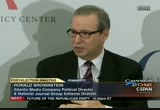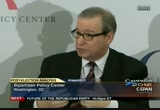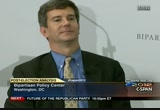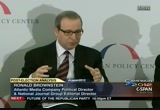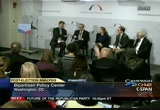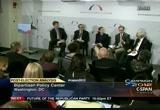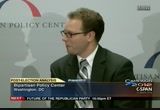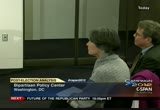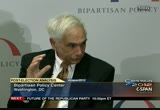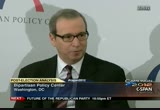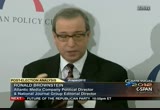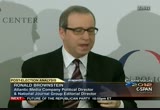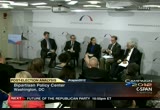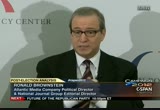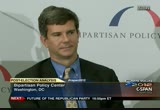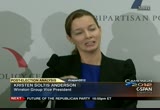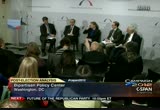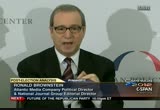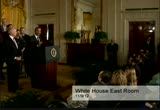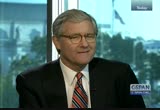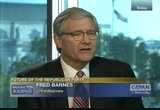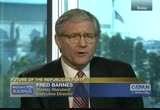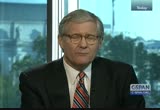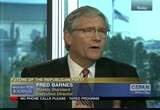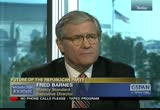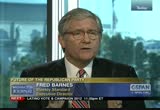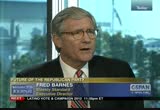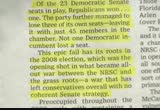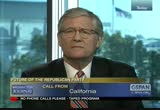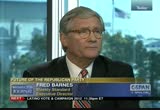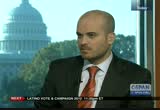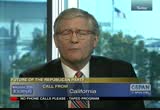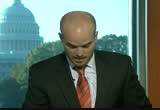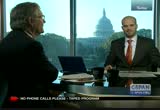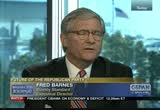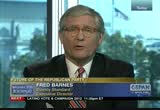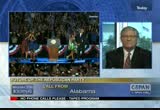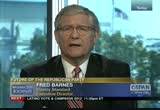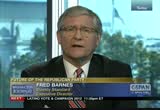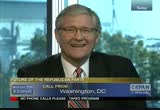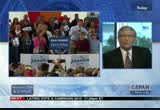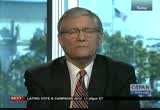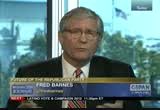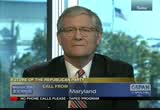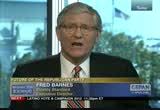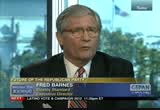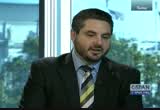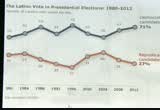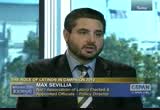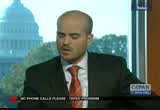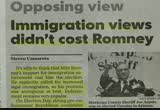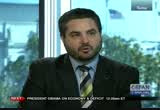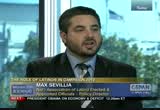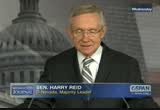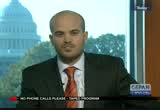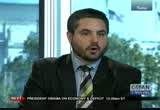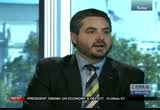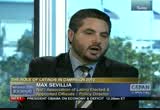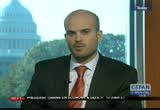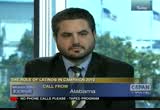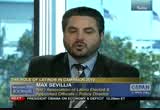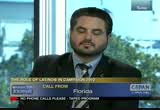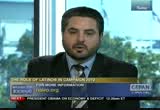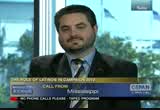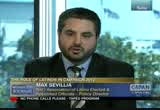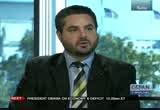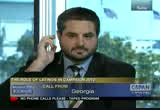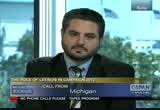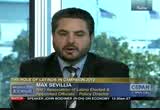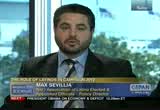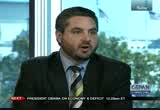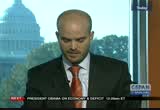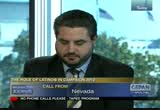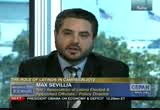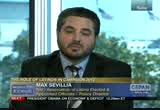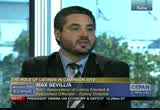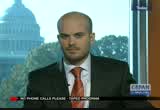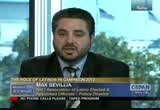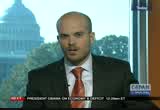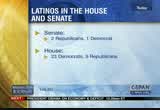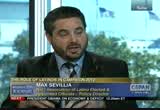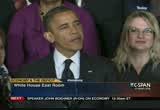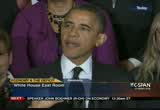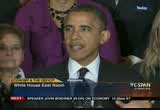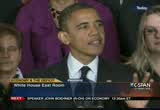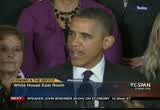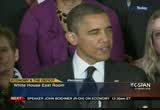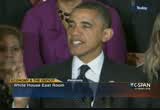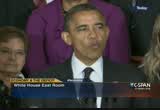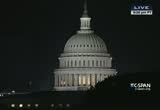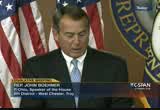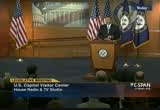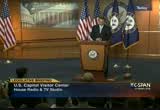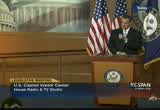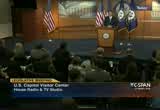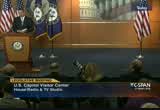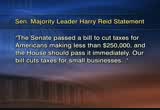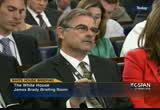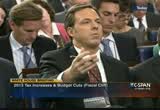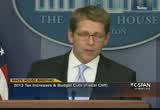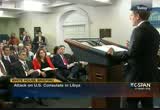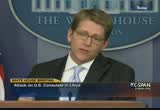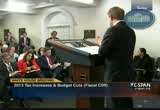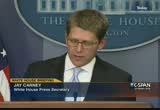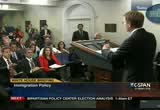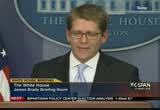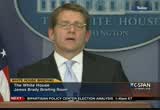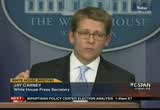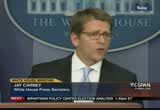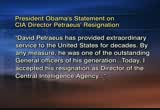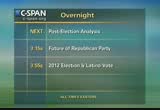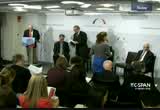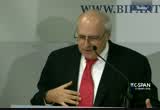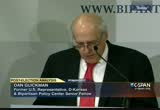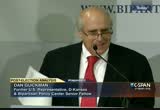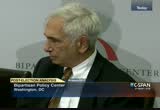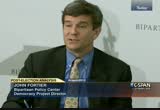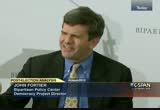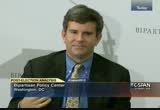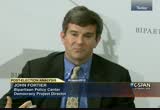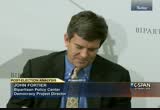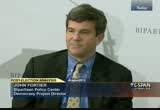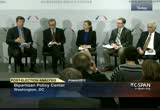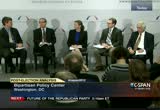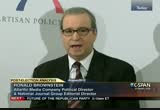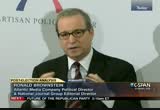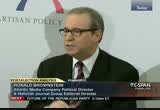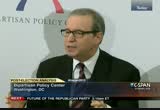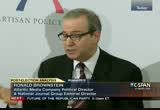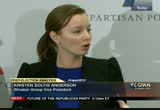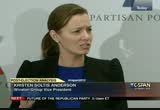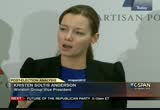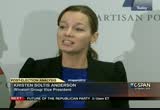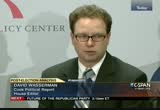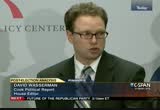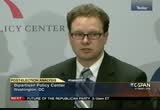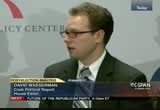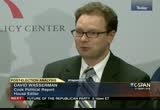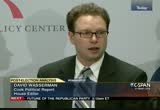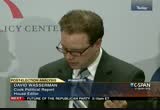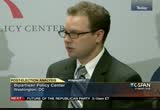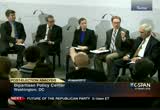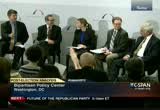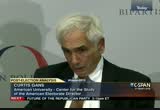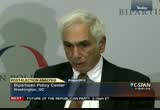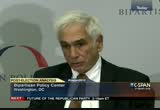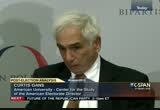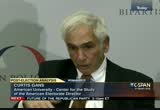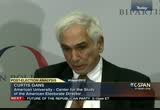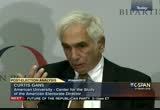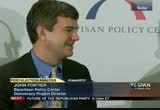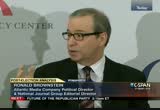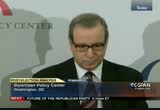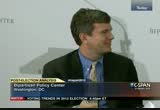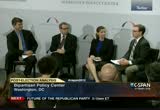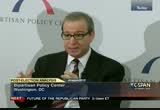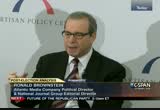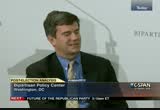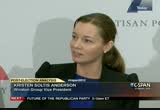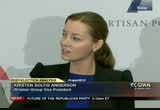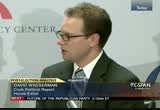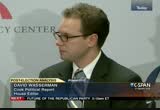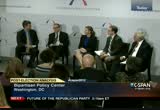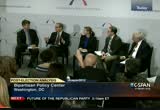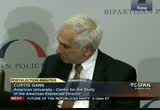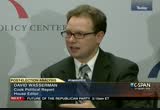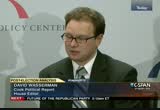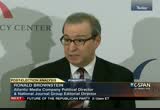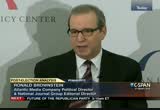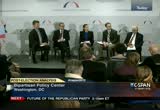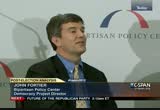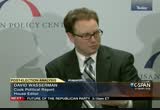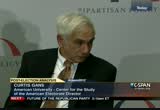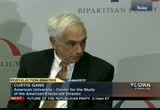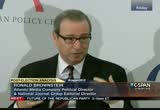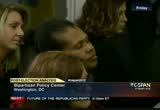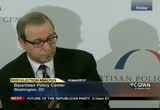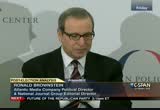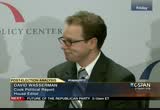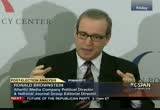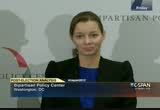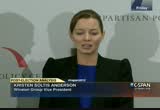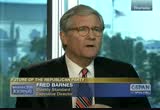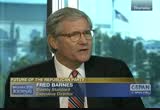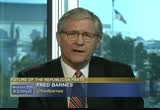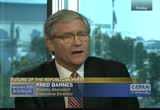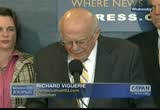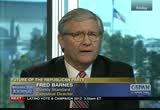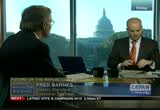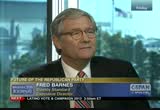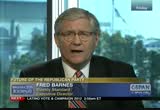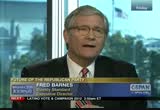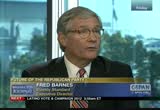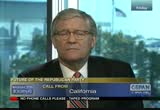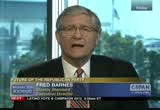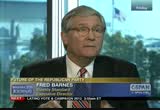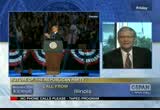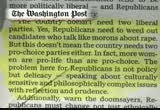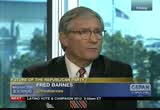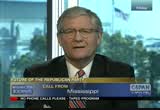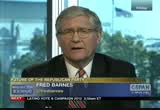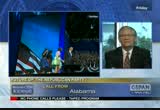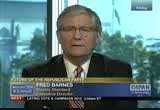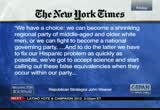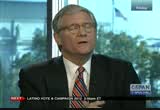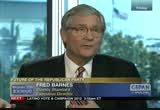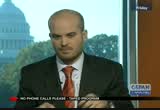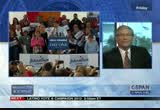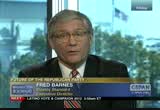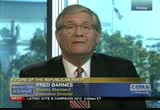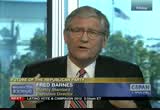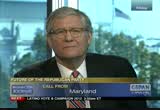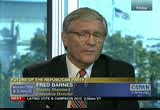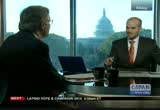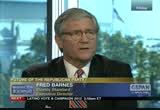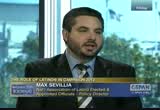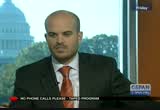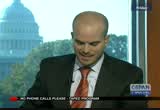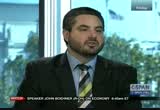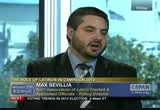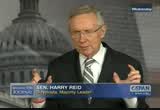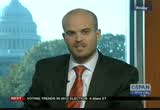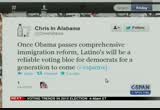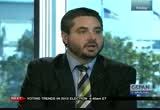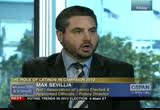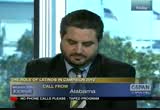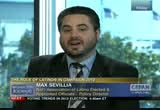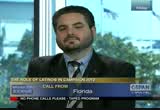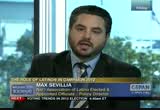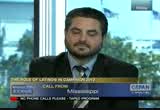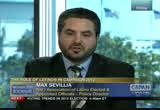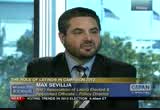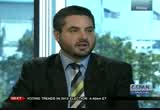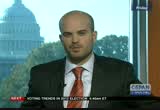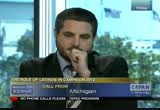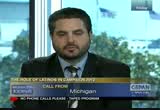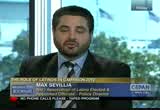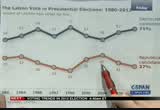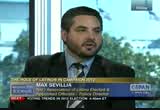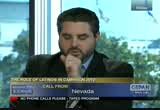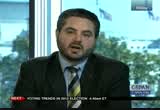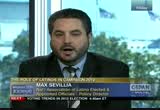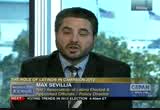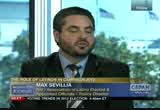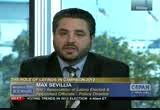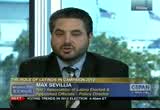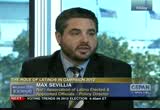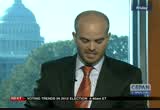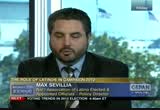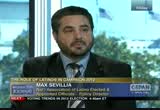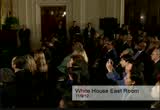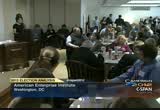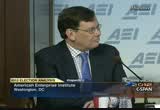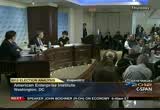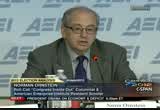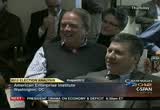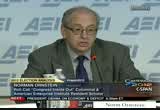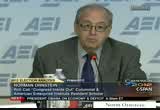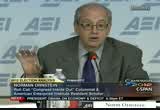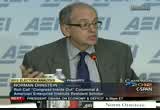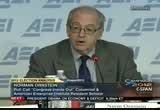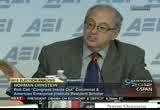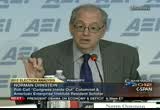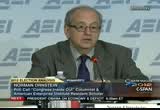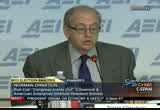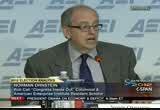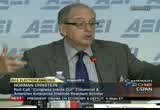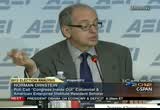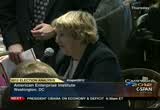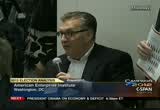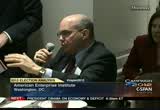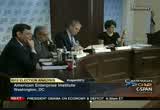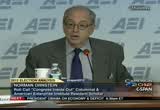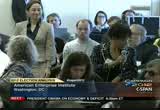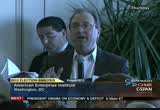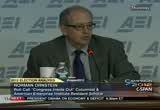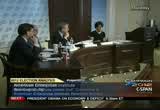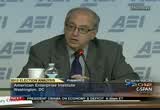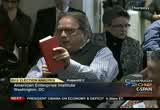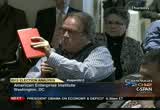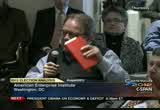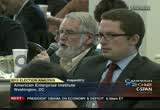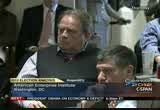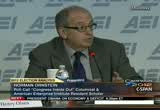tv Politics Public Policy Today CSPAN November 9, 2012 10:30pm-6:00am EST
10:30 pm
i think in general, the tea party was positive for the republican party in the sense that it was eighth movement of the party itself in 2008 did not have much infrastructure to mobilize people. both bush and cheney model has really fallen apart. there is a grassroots of people or fresh sitting with all the spending. i do nothing to distance themselves from that. take a look at what the primary field look like. 2016 will not look like that. i think will be allowed much less of an appetite for someone who says i have this 9-9-9 plan and suddenly they search into the top of the polls.
10:31 pm
i think it was like somebody that the tea party likes. >> ok. next question. >> rob. i am with an equity group. question on the size of undecided populations. a little commentary to the debates and how important they were. >> well, i mean, in the end, obama won by a little more than the polls anticipated. more likely he produced an electorate. whoever won, we would wake up on election day and produce a little different electorate than
10:32 pm
anticipated. that is what happened. the electorate was more non- white than most polls anticipated. there was that. the debate had a huge impact. the first debate fundamentally changed the race and put romney back with and range. obama was able to stabilize at the end. but romney presented himself as an acceptable alternative. romney was able to walk over the threshold. in the end, he never addressed the demographic challenge. and the third debate he went back on some of the language.
10:33 pm
he talked about amnesty and deportation and basically ensured that number among hispanics. barack obama increased its share of votes among hispanics. that is a statement more about the republican party than the democratic party. >> that is not two waves. one was out of the democratic convention. that was a surge for the democrats. the second was a chance for the challenger to put himself on the stage. i think people were talking about romney's momentum. he got back in the race. he got stuck at a point where he could not go any further. >> let's go to this part of the room. let's go here.
10:34 pm
>> u.s. news and world report. it seems the coalition was unable biunique elements of this election. he have the bain background. how will they try to recreate the coalition? >> great question. a year ago, i would have said -- he ran poorly among blue collar and older whites. even with paul ryan on the ticket, a 60% of seniors voted for romney.
10:35 pm
in the long run, i think those red states are problematic for democrats. look at north carolina. in north carolina or virginia, obama's numbers among blue- collar whites are unbelievably low. they are in the high-20's or 30's. in the long run, i do think there is this pattern. the sun belt will be more important than the west about. they do have the incredible ability to hang on to -- the shift will be to states that have the same social forces of rising diversity and rising education levels. >> we have a slight disagreement. obama did well among these groups in 2008.
10:36 pm
democrats do well among white blue-collar voters in the midwest. there are union presidents and other things that give them a boost. there is a slight fracture of the automobile bailout. ohio did not look that different. i think of no bailout might have helped a bit around the edges. boy, running against and john mccain in 2008, barack obama did well among those groups in those states. he did well in iowa. he overperformed. >> i'm guessing it is bigger in 2012 than in 2008. >> at the performance is a little bit overstated.
10:37 pm
dig into the data. it is not quite impressive as the polls might have suggested. i had to brag a little bit. i was having a fierce twitter debate over the nature of ohio. nate's model has predicted in this election and had a 49.6% chance to beat ohio in the electoral vote. the tipping state was colorado. where did romney's 47% remarks get him? 47% of the vote. >> we talk about how non-whites are growing, particularly among latinos.
10:38 pm
unions are shrinking. for the 6% of voters were from the union households. this ticket was only 18 percent. i do think that you are right. it will be more about the sun belt than the rest. >> non college white union members. this is pretty striking. >> let's have another question. in the front. >> you spoke about the long-term trends of declining voter turnout and increased polarization and the emotionalism of voters. do you see a shift in that and the declining quality of public education? >> i think the declining quality and quantity of civic education
10:39 pm
tells of the fact of the majority of people in the household were their parents do not vote and a large majority do not discuss politics, those are some factors that definitely impacted. i think a shift to consumerist values and libertarian values has been attributed. every new generation of media, it probably started with television and now we have the internet and iphones and facebook and all of those things that its smaller committees of larger communities. i think those things will double-when you do not have that type of tensions we have had over the last eight years, i think those things will be more important in the long haul than any individual election.
10:40 pm
10:41 pm
>> there are a lot of polarization's. we are in an era where the party coalitions -- there is an enormous amount of politics in every possible direction. there is a book written called "what is the matter with kansas?" a lot of upper middle class white voters are going to get higher taxes are nonetheless voting democratic. the minority communities feel unwelcome in the republican party. his politics are much more conservative than college educated whites on issues like gay marriage and abortions. they are sending this message, we do not want you here. on that point, i think the push for the voter i.d. laws in this election will be seen in retrospect as something close to the proposition in california. incredibly shortsighted with long-term consequences. whatever those republican governors and legislators thought they were doing, every latino population in the country and thought not only are you not
10:42 pm
competing for are revoked, you do not want our vote to. the gop is not even getting up to have argument about policies of this point. there is this time of tremendous identity of -- how often do you go to church? there is the identity politics. our system is frozen with the two out of three close presidential elections happening. >> right here. >> janet. george washington university school of public health. there was a lot of discussion on women's issues. i am wondering if you can speak to the role of gender in the governing.
10:43 pm
we are seeing more candidates who are successful in their elections and one state's -- is entirely female. >> kelly ayote. when you have that kind of coalition and the democratic party and that remarkable picture of the congressional committee of all republican and not white men talking about contraception or ever was before the committee at the time, that is an image of perjury is exactly why republicans are having a hard time in connecting with female voters in that gender gap.
10:44 pm
>> romney did significantly improve among white women. not only did not college white women, but also the college white women. this is the first time the democrats have lost them since 1988. >> there is also of the marriage gap. if you are a married woman, you vote different in different ways. that is another thing the republican party is facing. there is new to an era where you bought your identity rather than your interest. >> i went to a romney event. most of them were married white couples with kids. when you go to an obama event, it is the whites, blacks, couples, kids. the challenge of governing a
10:45 pm
that the country, these two groups that are different in their priorities and cultural values, they're almost equal in their size. the republicans have been able to insulate themselves within the one america. >> conventions of the same feeling as well. >> i do not think he will see a democratic leadership of the house ever again that does not include at least one woman and one african-american and latino. where as republicans, they need a lot more than -- they really need to put out a different face, an image in order to compete more broadly.
10:46 pm
10:47 pm
that happened in 1992. that is the smallest share of the electoral votes. the demographic challenge is also a geographical challenges. because of these places we have more cosmopolitan and secular populations that are diverse on the coasts. >> they have all the mountains and the farm states. that's it. >> one last question and we will wrap up. >> thank you. i am an independent consultant. i want to go back to the aid groups and talk about the contrast and the complex between the boomers and millennia ills, particularly lead in the demands
10:48 pm
for entitlements that is coming out. the millenials will have to pay for this. what does that look like in terms opf tax structure and other things? >> polls shows that when young voters are asked if they will see social security, only 17% say yes to that question. there is a serious belief among people that we are on and on stable fiscal path. the deficits and a spending is the issue on which they trusted republicans more than democrats. and that was a big debate. young people say that paul ryan is down and likes proximity that
10:49 pm
will appeal to young voters. that did not pan out. maybe it will be attracted to young people who know that there needs to be a big change. i still feel like many young people have not fully woken up to it. they have decided, i will probably never see social security and medicare. it is a big problem. it does not seem like there is any good solution on the table. it is not like young voters are flocking to one party or another. i do not think the parties have been given any incentives for young voters to go for them. they need something to win them. >> the party that talks about entitlements as one that does best among all the voters. [laughter]
10:50 pm
>> voting your culture. >> the problem is not that they are not willing to pay for the baby boomers are. the problems of the boomers are now willing to pay for anything for the millennials. the two is generations shifting our nation is about millennials and the baby boomers. what we see are the moving in different directions in the view of the government. the baby boomers voted 60% republicans. the have grown hostile to any kind of programs and taxes and are willing only to have government fund medicare and social security and not entitlements. they become hostile on spending on the younger generation which is heavily non-white.
10:51 pm
unless we do a better job of getting those diverse millennials into the middle class, there is no way to pay for the programs for the baby boomers. 60% of white seniors voted for romney. these two generations are locked and loaded to collide for the next several decades for control and direction of american politics. >> on that note, let's thank our panel. [applause] [captioning performed by national captioning institute] [captions copyright national cable satellite corp. 2012] >> a look at the impact of the latino vote on the presidential election very president obama and john maynard talked-about
10:52 pm
the fiscal cliff. -- and john boehner talked about the fiscal flat. president obama will be at the riesling say -- wreath laying ceremony 11 am eastern on c- span. >> 2013 should be the year we begin to solve our debt through tax and form an entitlement reform. i propose we avert the fiscal cliff together in a manner that ensures the 2013 is the year are government comes to grips with the major problems facing us. >> i am open to compromise. i am open to new ideas. i am committed to solving our fiscal challenges. but, i did used to expect -- except in the approach that is not balanced. i will not ask students and seniors and middle-class families to pay down the entire
10:53 pm
deficit while people like me making over $250,000 aren't asked to pay a dime more in taxes kerry >> the newly elected congress starts work and to january but the current congress has work to do at the end of the year. work is expected on the impending fiscal cliff, x -- including the expiration of the bush eric tax cuts, raising the debt ceiling implant gus to domestic and military spending. loorow all the florida th debates. >> a discussion on the future of the republican party from washington journal, about 40 minutes.
10:54 pm
guest: including me. than romney losing. obama may have been the only democratic candidate running on a record of a weak economy and debt crisis that we face and still win. yet, he did. they did very many things that were right. you can point to a couple of things with mitt romney. he may not have been the perfect candidate for 2012 given his corporate turnaround background, secondly, he did not get something republicans have counted on and that is the white working-class voters. in states like ohio, the ads attacking mayor romney as a corporate raider and buccaneer that went on for many months put
10:55 pm
on by the obama campaign seemed to work. the white working-class vote did not turn out for mitt romney in the numbers he needed. host: you had a piece yesterday, "the survivor in chief." you know to that they expose the myth of the enthusiastic democratic voter. guest: it was a myth i subscribe to for a while. i am sure you read about this over and over again. the democratic voters were dispirited and they were not feeling enthusiastic about the campaign. it was the conservatives and republicans fired up and getting ready to go. the notion was, he would have this surge of republican voters and a depressed democratic turnout. there was a pretty good turn out of republican voters, but there was a surge of democratic
10:56 pm
voters. it was amazing how well obama did at putting together the coalition that elected him in 2008. the idea of a lack of enthusiasm would keep them from voting did not happen. it turned out to be a myth. if you are an enthusiastic voter or unenthusiastic voter, you only get one vote. host: was there and over confidence born from how well republicans did in the midterm elections? guest: there was an expectation that republicans really had a good chance of ousting president obama. that became harder to expect as we got really deeper into the campaign, particularly this fall.
10:57 pm
it was boosted again by his performance in the first debate. the truth is, i would not say there was ever over confidence that was going to happen. host: we are talking to fred barnes. you can join in with questions and comments. the phone numbers are on the screen for you to start calling in now. i want to take you to this editorial in "the baltimore sun." the headline is "diversity and the gop." guest: when you lose 50% to 48%, i would not call that a lopsided loss. it was a pretty close election. mitt romney lost by 2.5 million of votes. that is not a squeaker, but it is not lopsided either. i think there are two birds that are very important that republicans have not done well
10:58 pm
in. the obvious one is hispanics. host: 71% of hispanics for obama. guest: when you go from getting 44% of the hispanic vote to 31% at john mccain in got to 27% that mitt romney got, that is a bad situation for republicans. when you have the group of growing faster than any other group as part of the electorate and you are shrinking in your share of the vote, that is a big problem. this is one republicans are going to have to deal with. the other groups -- obama did not do well among the white women. the number is a little distorted because so many are hispanic women. an african-american woman that may be voting for the democrats for other reasons.
10:59 pm
host: exit polls show that female voters went 55% to 45%. guest: we have a gender gap a denture every election except for 2010. and republicans came out even. in presidential elections they have not done well. 11 points is a lot. we will have to think about doing better. i think you do better when you have better candidates. host: talk about the third part of the editorial, the young voters. guest: when they get older, they become more conservative. i do not mean to be dismissive about that. one of the surprises about the obama campaign was how well they turned out the young vote. i think it was almost the same share of the electorate as it was in 2008. i did not think that was going to happen, and yet it did. republicans are going to have to think more about how they are going to get the vote. here is another place where i think republicans really need to
11:00 pm
do better. it used to be a place where they did very well. that is the suburbs. obama did extremely well in the suburbs. i have lived in the suburbs across the potomac river. i live in alexandria, virginia. i grew up in arlington. those are inner suburbs. they have become very democratic. a republican is not going to windows. -- a republican is not going to win those. as you get further out, that becomes the republican heartland. he when virginia if you get over 40% of fairfax county. romney got 39%. in the exurbs where republicans have done so well up until they have had to face obama twice obamain loudoun county, 25 miles outside of washington, d.c., obama got 52%.
11:01 pm
he got 57% in prince william county. republican governors, the governor who was elected bob mcdonnell in 2009, one of those areas. mitt romney and john mccain did very poorly. the suburbs is a place where republicans are going to have to do better. host: you have used the word turn out. is the democratic turnout operation simply better than the republican operation? guest: i think you had it right. it is the obama turn out. host: does that go away? republicans guest: can hope so. i am sure the democratic party has figured out, we have to repeat this. we have seen what the obama camping can do. we are going to do it again. republicans, they had a
11:02 pm
republicans, they had a much better effort by the party. i had a turnout party by conservative groups that made millions of calls. it did not produce what they hoped it would. they got a lot of voters out, but obviously not enough. host: i want to take you to a clip of a conservative writer talking about what needs to happen with the republican party. >> the republican national chairman, mitch mcconnell, john boehner, and other republican leaders behind the epic election failure of 2012 should be replaced with leaders more in tune with the conservative base of the republican party. likewise, established republican consultants establishedkarl rove, romney campaign senior advisers, and pollsters should never be hired
11:03 pm
to run or consult on a national campaign again. nobody would give a dime to the ineffective super pacs like american crossroads. the loss was the death rattle of the establishment republican party. the disaster of 2012 signals the beginning of the battle to take over the republican party and the opportunity to establish the gop as the party of small government, constitutional conservative. host: do you agree with that assessment? guest: not at all. k i do karl rove, the pollster for the romney campaign, and all the others he listed, the republican national chairman -- they are not the problem. the truth is, while i think the tea party is a great addition to the party, the candidates who were truly identified as
11:04 pm
tea party candidates in 2010 and 2012 lost in many cases. i do not think it was a problem the republican candidates were inadequately conservative, and they were in many cases not good candidates. it helps to have good candidates, people who can run graces. not those who can flub an abortion issue. and by stumbling on the abortion issue and the idea of rape, they lost those races. host: the stat on the senate races of the 23 democratic seats in play republicans won one and the party further managed to lose three more of its own seats and the chamber, not one democratic incumbent lost a seat.
11:05 pm
one calls it the g.o.p.'s epic senate fail. >> i don't know about epic, but it certainly was a fail. host: was john cornyn to blame on this? guest: he is not to blame but he will get a lot of the blame. i mean, he didn't put words in the mouth of todd about women who had been raped and in indiana when he flubbed the same issue. so he is not really the problem but the guy at the head of the senate republican campaign committee. so he is going to take both the swings and the arrows. host: randy, you're on with fred barnes. caller: good morning mr. barnes. i really don't want the republican to be in -- never
11:06 pm
mentioned the republican party coming to the black vote or the asian vote. 2014 is a -- republicans will work with barack obama because they want to be elected again, because this country cannot stay this way. host: fred barnes? guest: i agree with that, that republicans are going to work with president obama and will he have to work with them. even ronald regan had the iran contra scandal and bill clinton did have impeachment. so they are really tough and in your administration your best people, your first team you have on your staff and in
11:07 pm
cabinet positions in your first term, many of them go away in your second term so it's one where democrats and republicans are going to have to come together especially on the fiscal issue. we know what will happen. we will have huge spending cuts in defense and it will go into effect january 1 or the bush tax cuts will expire as of january is so they will have to do one of two things, either have a stopgap measure and let the next congress and president obama work out something over the entire year of 2013, tax reform measure and so on or they are going to have to act in the lame duck session. this is not ducking the issue but knocking it over to the new congress that had just been elected and the president who was re-elected and let them work it out in a very comprehensive way in 2013.
11:08 pm
host: mr. barnes the lopsided percentage african-americans 93%. what's the g.o.p. plan to reach out to them like latinas and women? >> the g.o.p. has had plans to reach out that have been utter failures. the best thing they won't have to face barack obama again. republicans are the conservative party and that's not going to change. i think what they need to do and this was an unimportant to election in a couple of ways. they need to elect more african-american republicans and a couple of them -- a big hope was a woman named mia love who was the mayor of a town, african-american mormon and
11:09 pm
they hoped she would win and she lost. in utah. and i would say mathison is one of the most conservative democrats in congress, and ran a great race and won and then allen west, a republican in florida is behind. it's going to be tough for him to win because they are not threw counting ballots. but that's one of the things they need to do is have more african-american candidates and have them win. host: republicans needing blacks and latinas in the party leadership not merely a voting block to be captured and used? >> yes. and they have done much better with hispanics than -- well, certainly didn't show in the election but in the house j.c. watts from oklahoma but indeed they need to do that. host: we'll go to joanne on the
11:10 pm
republican line from rancho, california. caller: fred, don't you think since 2010 was such a big victory, everything of concern was of obama care and that didn't seem to be brought up in the campaign so much probably because of massachusetts. but i think he still could have used concerns about that, particularly for religious liberty which is very important to hispanics and asians, which we lost big. i don't know if it's because of what john roberts did which was devastating, because i do think there's a lot of charity and hidden taxes in obama care that people are not aware of and in the next four years we know the president can use executive
11:11 pm
orders and i think a huge decisive victory. guest: when you get to a question i'm going to agree with you. i think you're right about obama care. correct me if i'm wrong on this. i think the exit poll showed by a narrow margin most wanted to change or repeal obama care. and it wasn't sufficiently hammered away by republicans in 2012. they were advised over and over again, particularly people writing for the weekly standard or -- yet it became a secondary issue for the romney campaign for one which decided the only issue that really mattered was the economy and he would focus on that and obama care would take second place and it did or third place or maybe fourth place. host: a couple exit polls on the 2010 health care law that came in, what should happen in
11:12 pm
2010 to the health care the law 26% according to exit polls said it should be expanded. 18% said leave it as is and 24% repeal some of it and 25% says repeal all of that. >> it adds up to 44% to expand it or keep it as it is. i wouldn't call that a ringing endorsement of obama care, and but we'll see and there are some republican governors who will have to decide now what they are going to do. this was one thing that was so clearly at stake in the 2012 election. are we going to have obama care? we're not. is it going to be implemented and installed and be there sflever well, you can decide that by voting for or against obama and obama won. host: good morning, connie.
11:13 pm
caller: good morning, and good morning fred. there is nothing wrong with the republican party. it is -- we lost this election by just a tiny bit. we should keep our values. hang on to our values. and the most important thing -- well, obama is getting ready to take off and run to all these countries giving his nation-building speeches and giving his family a vacation and all this and that, but there's only one nation that we should be nation-building with, and that's israel.
11:14 pm
because israel -- israel is -- that's god's chosen land. the jews are god's chosen people. host: ok, connie, let's give fred barnes a chance to comment. guest: well, i mean that was an issue between romney who was much more pro israel though publicly in particular. we'll see how that turns out. i personally don't begrudge him a vacation after the campaign, like to take one myself. but there was another part -- oh, yeah. what she said in the beginning about the republican party. is it really in deep trouble? i don't think so. obviously hispanics are a problem. younger senators and governors, they have 30 governors who are extremely important, 30 out of 50. like bob mcdonald in virginia and bobby jindal and scott walker in wisconsin and so on.
11:15 pm
republicans actually -- romney actually won i believe the middle class. if you have the middle class as people who make between $50,000 a year and $100,000 a year, romney won that group narrowly. the middle class is up for grabs but romney did well enough there but just not well enough to win. host: on the question of what the republican party needs to do, charles route hammer writes in today's "washington post," the company doesn't need two liberal parties. yes, the country needs to weed out morons who talk about rape that way but the -- agree with that statement? guest: that's well-written. i'd like to say. i know charles and -- when you -- are you pro life or pro choice and pro life?
11:16 pm
but got a majority. the republican party is going to continue to be the pro life party. the one in missouri and the one in indiana were peculiar and if you're a pro-life republican who can't discuss the issue in a way charles says is delicate and sensible, then you're going to hurt yourself. but those are aberrations. those two republicans running in missouri and indiana. host: on the republican line, good morning, d.j. caller: hello.
11:17 pm
i want to know why it is that the republicans are so one-sided and really don't look into minorities like they should. you say they do, but i believe they try to hide what they really think and hold it to themselves because you know no one can really go into countries and analyze what they say about anything. you saw the video they had on mitt romney they had about 47% and msnbc and i don't agree with it, and i feel like the stuff he was saying behind closed doors, with the republicans were really thinking and what he said in public, nobody is really going to say what they really think on national tv in front of millions of people. i want to know why -- guest: i think you get fletch public what republicans really believe in. the 47% was not only a dumb statement by romney but an inaccurate one.
11:18 pm
because it includes people on social security or retirement so the idea that somehow 47% of the population because they do get something from the government so therefore they are democratic voters is not true. but in truth, i think say look republicans are conservative and talk about it and some don't do it as well but i think what you see is what you get. that's what you got from ronlt regan and both bush presidents and who is more republican than oncane for republicans in 2008? and i think you really heard from mitt romney what he really believes. host: on twitter, republicans need to anchor their campaigns on liberty and individual
11:19 pm
responsibility to educate the voter on america's heritage. now to elizabeth. you're on with fred barnes. caller: good morning. guest: good morning. where is union grove? caller: where is union grove? guest: yes. caller: right outside of alabama. guest: ok. spoir. go ahead. caller: well, i think obama needs to get his priorities in order instead of going out of country right now. he needs to stay in the united states and address the libya and benghazi attacks where we lost four outstanding americans. he needs to go to the east coast and take care of the fema
11:20 pm
things that people are not getting help and now it's snowing on them so they are in even more distress than they were and i think they should put off going outside of the country and address what he needs to address first. >> well, i think you are right about it but a lot of things are forced on him right now. the spending and debt and another vote will be coming up early next year on the another debt limit increase. look, he is going to have to deal with those and there will be some important testimony when the general who was in charge of i think the african command in the u.s. military will testify before some committee in congress. then we're going to learn a lot more. because the whole benghazi issue is not going to go away and the president is i think going to have a different set of priorities, because they are going to be forced on him. the president has basically ducked the entitlement issue
11:21 pm
for his first term. he is going to have to deal with that. because it won't go away and medicare and medicaid from spiraling out of criminal -- out of control fiscal and these are the things he will have to deal with whether he likes it or not and he's obviously reconciled to dealing with them. host: a recent column in "the new york times" after the election, john waver. want to read you his statement. he says we can become a party of -- to do latter we have to fix our hispanic problem as quickly as possible. we've got to accept science and start -- start calling out things that are just not true and not tolerating the intolerable.
11:22 pm
host: he referred to the climate change issue. guest: that's a great dispute among scientists. whether the projections of the climate catastrophe later this century are going to happen or not, i don't think the science, while some of the global warming people are telling you the science people are excited, we'll find out. i think it's a debatable issue. host: do you think it's a bigger issue the president takes up after hurricane sandy? guest: well, he suggested he might but i doubt -- john, given the issues that are on his table right now, if he takes it up, it's going to be leitner his second term. host: on twitter, mr. barnes,
11:23 pm
will jeb bush run in 2016? >> -- guest: i thought he would run in 2012. he has incredible experience dealing with hurricanes and other emergencies in florida. he's a likable guy. he appeals to both mod rats and conservatives. he will be what in his early 60's if he plans to run? i hope he would run and would be an extremely attractive candidate. paul ryan who is back in the house of representatives because he was re-elected to his house seat while he lost the vice president election.
11:24 pm
it's a very strong bench. i'd have to say, jeb bush is a part of it, and i would have him on the part of the bench where you're the first stout come in. host: -- guest: you can argue they are a younger generation. some are in their 40's like ryan and others a generation that hadn't arrived at the presidential level. i didn't agree with that. but they all decided not to run for the white house. host: let's go to john from near washington d.c. on the independent line, you're on with fred barnes of the "weekly standard. caller: bob. yes, you said that paul ryan is a good candidate for the future? the guy couldn't even tell the truth about his marathon run,
11:25 pm
and then he takes a tour of a soup kitchen, and he cleans up after the place is closed. romney, i mean, my god the guy lied throughout campaign, and you would actually support a guy who lies to the american people about jobs going to china with the jeep? host: how did paul ryan do on the campaign trail? guest: well, i thought he did extremely well and i thought he flubbed that news about the marathon but if he did it in the time he said he would be on a marathon-running circuit. that was just a mistake. he hadn't run it in about is 1 -- in about 11-12 years. i know paul ryan. paul ryan is not a liar.
11:26 pm
and with mitt romney, the whole question about the jeeps, there's a dispute whether chrysler, which owns jeeps jeep is going to have to go to italy. there's a story about that. on the china issue overall for romney, that was an issue that didn't work. there are issues that poll well, but when you try to rely on them in a campaign, they just don't get you any votes. i think china is one of them. host: we'll go to jim on the republican line. you're on with fred barnes of the "weekly standard. caller: hi. i was going to say i believe what the lady on the republican line said earlier. that republicans don't need to change. we need the conservative stand,
11:27 pm
and the biggest problem is that i believe the country is getting to the point that they are so dependant on the handouts of the government that that's what they are looking for. they are looking for a liberal, somebody that's willing to give them anything they want. guest: john, i have to say -- it is john? caller: jim. guest: i have to disagree with that. the republicans won the house overwhelmingly and botched a few senate seats but it was a great republican and conservative year. that was only two years ago. i still think we have a center-right country. although after this election it looks more toward the center than right but indeed there are probably a lot of people getting things from the government but some are military and so i wouldn't be pessimistic at all.
11:28 pm
i mean, right now at this moment, they certainly -- it's a moment for republicans. that always happens when you lose an election. but the media, they have done this, the democrats, too,. the -- the media immediately says that oh, this party, it's got an identity crisis and it's got to self-exam. it needs self-examination and so on. it doesn't need much of that. the republicans have some problems. we know what they are and we better deal with them. the hispanics being one and suburbs being one. sometimes in senate races you just need people that are better at politics, better at running for office. host: dorothy on the independent line.
11:29 pm
good morning. caller: good morning. good morning, fred. guest: hi. caller: you know, fred, there's nothing really wrong with the republican party and the things you all stand for, because i am pro life as well. but what you all need to do, because we need two vyible parties. we really do, and i want to see that in the republican party, but you all have really got to take a second look at -- and let me finish, because i'm not going to say anything bad but rush limbaugh, laura ingraham and fox news, they need calm down. because they are putting you in a box. so you can't talk to the latinos, the blacks. if they would stop and let's see some ideas. i want positive. it's hard to vote for republicans when you got these people aalienating republicans
11:30 pm
because they make it seem like it's a bunch of hate groups. guest: rush limbaugh and laura ingraham are going to continue. they have an audience and that's just one of the things that's important to conservatives are these people on talk radio. can they alienate folks? i'm sure they can. are they going to go away? no. i certainly can't tell rush limbaugh to go off the air. and if i could, i wouldn't anyway. i think fox news is different. i've been on fox news since it began in 1996. fox news, most of its shows are news shows. i know most of the reporters there. i don't know what their views are. i don't know whether they are conservative or democrats and i
11:31 pm
don't know what their real political views are. but i know they are good reporters. then there are shows that are clearly conservative shows. bill o'reilly, shawn hannity. greta van susteren is on after those two. she a conservative? i don't think so. and i don't think she has a right-wing show. so i wouldn't put those in the same category as other talk show hosts. >> caller: i agree somewhat with him but when people hear a republican candidate so rush or somebody says something crazy, and i like some of fox news but when they say these crazy things and say a reporter comes up and -- candidate, i would like for you all to have more ideas.
11:32 pm
you have good ideas, but no one knows what they are. let me give you this little advice and then i'll -- and this is coming from a black woman. instead of saying something negative all the time, come with an idea. instead of saying this, say this is what we can do and this is how it can make your life better. host: fred? guest: i agree. politicians in general could. people complain about negative ads.
11:33 pm
but there's a reason why they are so prevalent on television. they tend to work. think of the negative ads attacking mitt romney. it's been reported that the obama campaign spent $100 million on these ads between late spring and summer. and they worked. that's why we see so many of them. these are the ads demonizing romney as a cooperate buccaneer. so we will continue to see negative campaign ads in the future. host: we want to ask the same question we asked our viewers. what should the president be focusing on in the second material? -- in the second term? what do you think he needs to address? >> well, obviously, the economy and then the whole fiscal crisis issue involving taxes and the sequester that would really cut in not only to
11:34 pm
social spending but particularly into defense spending. and look, he is not going to be able to avoid that. we do have a sluggish economy. i happen to think obama's policies have been wrong. and if he provided more efreedom of investment. there's money sitting on the sidelines that needs to be invested but i would hope the president would move in a more free market direction, providing incentives to people investing and who would invest in economic shings. i don't expect it. and in the long run, though. immigration is a huge issue. it's got to be dealt with. i think republicans are ready to deal with it. and people like john mccain have dealt with it.
11:35 pm
11:36 pm
>> they decided the press president the reelection of president obama as well the majority on the senate and number of house seats. we saw the importance of the latino vote at the state level. over 10% of the electric boat was -- electoral vote was from the latino community. that is historic, double digits. more than 13 million latinos voted. we know the numbers were decisive. how the latino vote breaks in terms of party association, that is really what is striking. the latino community is the most independent of all voting blocs. they were 71% to 75% in favor of obama. host: is the chart -- hear is the chart. -- here is the chart. it was well lowest showing
11:37 pm
since president bauble -- since presidential candidate bob dole. was this president obama winning the latino vote? or was it mitt romney losing the latino vote? guest: i think it was both. there was a failure to get -- to get immigration reform down during his first term. he did not accomplish it. that was a big disappointment. the other thing is the fact that the number of deportations, immigrant deportations, was a record high during his first term. he deported almost twice as many immigrants as the first bush administration did. about 600,000 per year.
11:38 pm
we see the economic downturn has hit the latino community disproportionately. currently, the unemployment rate for the general community is approximately 7.8%. yet it is close to 10% for latinos. there is a lot the president has to do in his second term. governor romney took certain positions, particularly in the primary, that really went against the latino community, things like self-deportation. there were a lot of things that he and the republican party have to amend, have to change in order to get a larger share of the latino vote. host: if you want to join in to this conversation with max sevilla, call us. 202-585-3880 -- democrats. 202-585-3881 -- republicans.
11:39 pm
guest: we have a membership of latino-elected officials from all across the country, at all levels of government. we also are on the ground, in the neighborhoods, doing voter registration. we do voter protection during the election. we do assistance with regards to naturalization. at the same time, we also do advocacy. i am the chief lobbyist for the organization in washington, d.c., on four issues in particular -- voting rights, immigration reform, naturalization, and the census. having good data on the latino community, challenges and potential, it is very important for the future. host: you talked about what mitt romney did in this campaign that affected the latino vote. this comes from "usa today." the director of research at the center for immigration studies
11:40 pm
rights that immigration views did not cost from the during this campaign. he writes -- your response? guest: their candidates that can win despite the latino vote -- and there are candidates that can win despite the latino vote. immigration was not a priority for the latino community. when they were polled before the election, they recognized -- they said unemployment, the economy was the number-one issue, as was for all americans.
11:41 pm
with regards to immigration, it goes to the heart of the community. it is that community feeling, which i think is so special with latinos. the tone that the romney campaign and the party used during this election, i did that is what pulled many latino voters from supporting republican candidates on the republican -- and the republican candidate for president. things like self-deportation were promoted. romney said that arizona and alabama were a model for state action on immigration. not really went to the heart of the latino community, which agrees -- about 65% of latinos know someone that is in the united states in a manner that is on documented. -- is undocumented.
11:42 pm
the discussion is also important to the porter rican -- puerto rican and dominican-american community. host: i wanted it to some comments that senator harry reid said on the possibility of congress passing immigration reform. >> we have tried, i have tried, i have spent more time on immigration teed of congress ago than any other administration. it is interesting what has happened. kennedy and mccain led that. mccain has not been with us on immigration reform. the only thing we need to get immigration reform done is a few republican votes. i get 90% of the democrats. couldn't we get a few of the republicans? it is high on my list. we are going to have some votes on it.
11:43 pm
if the republicans continue, it is that there peril -- it is at their peril. not for political reasons, but because it is the wrong thing to do. the system is broken and needs to be fixed. host: do you agree with senator reed's -- reid's comments? guest: for any politician, it is at their peril not to work on immigration reform. it is important to the country. the business community wants immigration reform. over 60% of americans polled at the exit polls say they want immigration reform. the current system we have is broken. it is costing -- causing situations that are unamerican, that did not go with the values and principles we espouse as a nation. host: let's take some calls for max sevilla of naleao. good morning.
11:44 pm
caller: first of all, i want to say that hispanic-- i am an african-american in my mid-50's. i have probably been through more racism, bigotry and discrimination in the first 25 years of my life than any white person or hispanic probably has ever had to go through. first of all, i want to say that they do deserve to get the very best that this country has to offer. they deserved it. when you get republicans going around saying that all the what is christophe, that is a -- all they want is free stuff, that is a lie. they can grow in a positive way. they are going to help this country. when i am listening to a lie, the only thing the republicans have to talk about is that they should have worked harder on getting the latino vote.
11:45 pm
of course african-americans voted 92% against them. you know what that came from? that came from experiences of centuries of being treated the way that we have been treated. let's not forget now, if it weren't for white americans who believed in equality for all people and african americans who fought the good fight, with the help of them, we would not be seeing hispanics and other minorities coming over here at the rate that they are. but, let me just say again, african-americans do not want anybody to have to go through what they have gone through.
11:46 pm
host: max sevilla, what do republicans need to do to reach out to the latino community? guest: i think that -- thank you for your comments. i believe that it is really a matter of policy. they need to a spouse, they need to support -- to espouse, they need to support communities that are important to minority people. these issues having to do with the economy, unemployment, education reform, health care, immigration. the tone that is used, particularly by elected officials, needs to be responsible. these are human issues, these are human -- civil-rights issues. these are important not just to the latino community, minority -- minority communities, but to the future of this nation. if we want a stronger america, we need to deal with some of the hardest issues impacting all communities. host: let me get your response to this week from alabama. "once obama -- tweet from alabama. "wants obama passes, for now -- from burton's of immigration reform, latinos will be a reliable voting block for democrats for generations to come.:
11:47 pm
guest: it would be a great thing to see a commitment from president obama to get it done. he is not the sole player in getting comprehensive immigration reform done. the senate needs to participate. then the house, which is currently controlled by the republicans, also needs to be a part of it and get it done. also in, what we need are responsible players -- ultimately, what we need are responsible players with regards to immigration reform. host: going back to the earlier caller and the experience of african-americans, hall writes, "is there any interest in the latino community in building coalitions with other ethnic minorities, blacks, and asians? -- asians?" guest: absolutely. a couple of weeks before the
11:48 pm
election, we put out a report where we projected that approximately 219,000 latinos will be deterred from voting or have their vote made more difficult. that was for just 2012. the issue remains in play. still very important to the latino community. the latinos came out in droves to vote and decide the election. there were too-strick voter -- too-strict voter-id regulations that came into play. hundreds of thousands of latinos could be impacted by voter protection, voter-restricting laws that could come into play between now and the next election.
11:49 pm
host: let's go to mobile, alabama, on our republican line. caller: good morning. i hear all these things, these lofty ideas for jobs -- american values, without ever telling them what american values are. anybody coming into this country should -- to find out what american values are -- first, learn the language, then learn how to read it, then get educated, then voted. -- vote. host: what are a few of those american values that you think folks need to know? caller: i think they need to know that we are a democratic republic, not just the democratic. democratics usually lead to dictators. there has not been a dictator in the last 100 years that did not come in with a democrat
11:50 pm
vote. i think we need to learn the issues that are going on and listen to things more than just the floury -- flowery things people say, and look at what they really want to do. host: your response? guest: if i may take for a minute -- talk for a minute about what i believe american values are, and the reason the latino community espouses them. i believe that freedom, liberty, patriotism. latinos are over represented in the american u.s. forces, the military forces. freedom of speech, freedom of religion. i think the caller was talking about democracy, democratic forms of government. over 13 million latinos, about 10% of the electorate, in 2012 -- 10% of the electorate in
11:51 pm
2012 was latino. that is unique. it is the latino community that illustrates how great of a nation we are. it is a new work community -- a newer community. host: let's go to jordan from port st. lucie, florida. caller: why do your groups always have to represent special interests? what can we not unite as a country? why do we always have to define ourselves -- divide ourselves? martin luther king said it best, we should judge people by the content of their character, not the color of their skin or where the came from -- i added the last part. it is real simple. it is about whether you want to come to the country legally and played by the rules, or whether you want to come to the country illegally and come in the back door.
11:52 pm
why is it races that we are accepting people from latin america -- why is it racist that we are accepting people from latin america? all the people from asia, europe, who are waiting in line, waiting in line for years, paying thousands of dollars to lawyers to get here -- to me, that is the racism right there. why are we just excepting latinos? what do you call yourself latinos? you are americans. if you get here legally, you are americans. host: respond. guest: we are an organization that has a membership of latino elected officials. that is part of the mission. we believe that, by greater participation of latinos and hispanics in the civic and political process of united states, we are a better nation. i believe there is nothing wrong with that. i actually think that, like i said, we're better for it.
11:53 pm
in terms of immigration reform, we are talking about a broken system that needs to be reformed. the de facto situation, where there are 12 million to 13 million undocumented immigrants in the united states, something needs to be done about it. we agree there needs to be a process, where the immigrant pays a fine, goes to the back of the line, a real process. because of it, we will be a greater, more diverse nation. host: let's go to jackson, mississippi, on the democratic line. caller: good morning. i'm very glad i got through. i'm very interested in what you are talking about. i am just elated that this gentleman is on and speaking of the hispanic people. i think they are doing a great job. they come here to work.
11:54 pm
their values are no different than american values. they want family. they want to take care of their kids. they want their kids educated. they want their children to be able to work in this society just like everybody in america. everybody in america huckster remember there -- america house to remember their ancestors came here for the same reasons -- everybody in america has to remember that their ancestors came here for the same reasons. the gentleman that was on before that was talking about we need to learn our values -- we have not learned our own values yet. host: max sevilla? guest: i take great pride in the fact we are upright -- a nation of immigrants. we are a melting pot. through our diversity, we have a new and interesting for festive -- an interesting perspectives -- we have -- we have new and interesting perspectives. we're talking about family
11:55 pm
closeness. many immigrants have made the move because of the welfare of their families, and better education, work opportunities. people are hard working, they are loving. that only adds to the american community. host: this issue was brought up in this column today. there is a perception among republicans that they can win back the latino community because latinos are more socially conservative, and therefore a more natural fit for the republican party. is that an accurate fit? guest: it is a complex community. there may be some commonality is based on religion and some other perspectives. it is really all about, my perspective, policies, interest, positions taken.
11:56 pm
when we started the program, we talked about how the support of the latino community gave to president obama was really a unprecedented. we would have to go back to 1996 to see that kind of strong support for one party. if we think back to 1996, what was going on was prop 187 in california, which so alienated latinos and drove them to the democratic party. president clinton was against prop 187. when latinos organized and participated in the process, they supported the democratic candidate. i think that there is -- unless the republican party comprehensively looks at what the latino community -- disavows such positions as the arizona immigration law or
11:57 pm
alabama, laws supporting things -- issues such as self-deportation -- self-deportation is a great example of the volumes and principles -- of the american values and principles we were talking about. the idea that we would make the life of an individual and family so miserable that the person would, on his or her own, decide to remove themselves from the country where they are at, where they have found refuge. that is not american values. that is heartless and cruel. that is the sort of position that the republican party needs to move away from in order to get more latino voters to support them. host: we go now to john from locust grove, georgia, on our republican line. caller: i want to ask a question.
11:58 pm
a doctor at north carolina university said latinos would be the perfect loading base for democrats because they are working -- perfect voting base for democrats because they are working poor. then you have the black panthers putting out $1 million contracts -- a murder contract, and nothing is done about it. then you have a latino house of representatives running out like little girls -- host: we will go now to troy from michigan on the independent line. you are on with max sevilla. caller: this is troy. just thinking about the latinos -- the mexican americans coming into the united states. i worked with the
11:59 pm
mexican-americans. the cubans. when theey -- they first come into america. we were trying to recruit guys to organize them into the union. i'm glad to see the support they have gave obama. the lifestyle of breaking away from the black community -- that is the scary part about the mexican-americans. what are they going to do once they get full citizenship in this country? guest: if i may respond to the last two questions. the latino community is really the ultimate independent community. surveys show that approximately
12:00 am
45% support the democratic party. about 25% support the republican party. the remaining 25% to 30% is truly independent. if we go back through the past couple of decades, we see that bill clinton -- president clinton got great support from the latino community in 1996. if we look at 2000 and 2004, president bush got about 40%. he got about 44% in his reelection. then we get to president obama, who got about 69% initially of the latino vote, now about 71% to 75%. you see how support from latino voters, the latino community can go anywhere from 44% for republican to 25% for republican -- from 44% for a republican to 25% for a re -- republican.
12:01 am
i think the republican party in this election and governor romney, in running for president, failed to communicate to the latino community that the positions that he and his party espouse or to the best interest of the community and the nation. that is where the opportunity lies. host:. the chart showing the latino vote from 1980 -- host: here is the chart showing the latino vote from 1980 to the 2012 election. what was he doing right with the latino community in that election? guest: when he first came off a stormy he talked about the relationship with mexico being the no. 1 -- came to office, he talked about the relationship
12:02 am
with mexico being the number one priority for the united states. he got distracted by 9/11. there were other issues. he talked about the relationship with england being a priority to the united states. he fully supported -- he spent political capital on immigration reform and other issues related to the welfare of the latino community. there was great support for republican politicians that a spouse issues that benefited the latino community. -- that espoused issues that benefited the latino community. host: mr. obama beat mr. romney by 58% to 40% in florida, 87% to 10% in colorado, at 80% to 17% in nevada, and 60% to 31% in virginia.
12:03 am
we will go to one of the swing state in this election now. -- a swing states in this election now. caller: i love the statement that he made about self deportation. absolutely right. that is basically what the gop party is doing, not just to latinos, but everyone else. it is basically 47%. one of the things i would like to mention -- i wrote this over 20 years ago -- we had 36 men in mexico who controlled 54% of mexico's gross national product.
12:04 am
how much can they need to buy? i am sick and tired of the 36 men in mexico -- the number of men in the united states, canada, central america, south america, europe and asia, etc., whose lust for more greed and power is destroying the entire planet for man and beast. that bothers me. i feel that they spend their lives living off a bus. -- off of us. as long as we obey their roles, everything is ok. -- off of us. as long as we obey their rules, everything is ok. guest: i think that oftentimes, the process that is taken in -- to having a greater appreciation for how democratic our process is, however when has 1 vote, one voice -- how everyone has one vote, one voice.
12:05 am
it strengthens our democratic process. somehow i would like add to what i said already regarding self- deportation, the issue of arizona as a model to the nation, the arizona immigration law, it pains me, it hurt me to tears when i heard very recently in the experience of undocumented immigrants in the state of arizona. what they are going through is just heartbreaking. it does not represent the principles that i live by.
12:06 am
there are parents with children -- parents do not go to pta meetings because they are concerned that, on the way to visit with their children's teachers, they may be caught because of a traffic violation and get deported. there are families that do not go grocery shopping until very late at night for that same fear. undocumented immigrants in places like arizona and elsewhere -- they learn code words and phone numbers where they can call and, just by mentioning this word, notify supporters and friends that they have been caught by immigration and they may be in the process of deportation. there is an entire system in place in the shadows to support the undocumented immigrants' families and to get them lawyers.
12:07 am
we can be much more transparent, accountable, we can have part in dealing with our immigration situation. i think that -- we can have heart in dealing with our immigration situation. i think that is what is encouraging what you heard from the senate and house, that immigration reform will be a priority in this second term. i think it is about time that we reform the system that is broken. host: a comment and question for you from the twitter users out there. if the 1980's immigration reform did not work to stop in the -- illegal immigration, why would it work now? guest: loss have been ineffective.
12:08 am
they have not strengthened this nation. they have not made it better. this system is broken. it gets us nowhere to ignore the fact that there are 12 million to 13 million undocumented immigrants in the united states. the case of students -- it is a fantastic example. there are some people who only know what is like to live in the united states. they were brought here when they were babies. they do not speak spanish. our broken immigration system will help them and their families -- will have them and their families deported. unless we change the system, we are doing an injustice to these
12:09 am
families, to the students, and to the american people. host: we will go to ed from philadelphia, pennsylvania, on the republican line. good morning. caller: he said this brings him to tears about the people and the way they are treated in the arizona. it brings me to tears to see the way people come across the border, have no respect for the rule of law. why aren't they having a mexican spring, like they did the arab spring? get rid of the corruption. make a better lifestyle. why come here and be a burden here and make us suffer and make us take care of you and bring our school systems down? somethingyou just do in your own country for god's -- country, for god's sake? i would, if i lived there. i would not tolerate it. why would you? guest: the latino community in the united states is a hard- working community that makes this nation better. i am proud of it and i think it strengthens the nation that we are. host: we go to lisa from
12:10 am
hartford, conn. now on the independent line. good morning. caller: i am calling to say that latino is not a race. there are black latinos, white hispanics. are you going to talk about the racism going on in mexico against black mexicans and in south and central america because there are afro-latinos? you're not talking about that. latino is not erased. you are trying to fool people. it is not a race. guest: it is an identity. we are better involved in working with the census bureau and how the community self defines in order to better understand the numbers, the needs, the challenges and opportunities. indeed, it is not homogenous opportune -- homogenous community. there is great diversity in terms of race and national origin, but there are commonalities within this community that bring us together.
12:11 am
host: j d riding on the twitter feed question we asked you before, the 1980's versus now, we were hoping you could talk a little more about the efforts in the 1980's versus how would change this time around. guest: this time around we are looking at a border that changed, a border that is much more protected. we hope to be in the process of redefining comprehensive immigration reform. we have learned lessons from
12:12 am
previous experiences. i think that what we learned this time around will be very different from what we saw in the 1980's were there were many things that worked, many successes, and yet there may have been some failures. host: we will go to bryan from pennsylvania on the democratic line. caller: i just want to bring a different side to this. i work for a major motorcycle manufacturing company for 27 years. we were a union shop. we had latino americans, african americans, every american culture. i worked very well with latinos. there were very hard working. i mean, they are american people. i do not know why people want to make out like they are not. they care about their families. they care about god. you know, i just don't understand it. but anyway, i used to be a republican until this year. 20 years, and i just realize the republican party is not really looking at the whole country, all the americans. they seem to be splitting them into groups and i don't agree with it. anyway, that is all i have to say. guest: i think that oftentimes
12:13 am
when we talk about immigration reform, we forget about the human aspect. we forget that it impacts individuals and families. very directly. i think that is important to keep in mind. what the caller was saying about being disappointed with the republican party, i think the polls have shown -- recent polls of shown that about 62% of the american people want to see immigration system reform. it is not the number one priority, but certainly an important priority of latinos, and also a priority of the american public generally. host: some statistics on how latinas did in house and senate races this year. two republicans and latinos and one democrat won seats -- to let you know republicans and one democrat won seats in the senate.
12:14 am
their 23 house democrats and five republicans elected this cycle. back to the phones. we will go to caught dead in liverpool, n.y., on the republican -- claudette in liverpool, n.y., on the republican line. caller: i would like to know what nationality you say hispanics are. we of black, we of white, what is hispanic? guest: i tried to answer the question about how latinos self identified. it is a concept still being worked out. there is great diversity in terms of race, in terms of national origin, yet there is huge commonality, not to spanish, but spanish language, but craig commonalities that unite the community. -- great commonalities that unite the community.
12:15 am
caller: good morning. i have more of a statement than anything. this country was founded on immigrants coming to seek government from tyrants and kings all across the world. to deny one person by saying this or that, i think the republican party at times would it meant -- would admit that it seems more like the conservative 1950's racists at times. we are a melting pot, and many nationalities coming together under one constitution. sometimes our leaders forget to knowledge that. immigration reform, yes, there need to be guidelines, but i think we're being too strict in some areas and not strict enough in other areas. host: the latino vote was of an all-time high this year, 10%.
12:16 am
what is the registration drive for latino groups. what does that mean for the mobilization of the latino vote in the future, whether it be the elections in 2014 or the next presidential election? guest: i believe the latino community was decisive in this election and will be decisive in future elections too. there is actually approximately 20 four million latinos that are eligible to vote, of which about 14.5 million actually registered for this election and approximately 13 million latinos actually voted. the opportunity is much greater, even right now, the opportunity is much greater for latino engagement in the electoral process than we saw in this election. with the changing demographics and the growth in the latino community, these votes are going to be even more relevant in the future.
12:17 am
host: thank you for coming by. >> tomorrow on washington journal, the tea party express chairman talks about the future of the tea party and republican party. the author of the last great senate speaks on the impact of tuesday's election on the senate and prospects for compromise on issues like the fiscal cliff. an from the marijuana policy discusses thest ballot issues voted on on tuesday. washington journal, live at 7:00 a.m. eastern on c-span.
12:18 am
>> next, president obama and john boehner talk about congress and the fiscal cliff. after that, the white house the briefing with jay carney. >> intently journalistic. and the scene get out and look at what is going on -- unless you get out and look of what is going on, he will miss the things influencing yourself and everybody else. >> , wolf american samoa live sunday from this year's miami book fair international. he would discuss back to blood and it's taken the city of miami. >> my favorite program as "book
12:19 am
tv." i also like the coverage of the book fares. occasionally they will cover lectures from different historians at universities. i thought it very informative. i like the diversity of the coverage. i learn about topics and made you would not encounter -- i may be would not encounter. and stories of the new south, that would not necessarily a pop up on search as i normally do. my husband and i sat there and watch it and learned a lot about the characteristics of a new versus old south. i also get introduced to books that maybe my friends and colleagues and not talking about. >> she watches c-span and
12:20 am
comcast. c-span, created by america's cable company in 1979, brought to you as a public-service breyer television provider. >> president obama says the election showed the majority of americans agree with the the as a reduction plan to cut spending. the president has invited congressional leaders to the white house next week to discuss the deficit and warned about the perfect -- the potential effects of the fiscal compared -- fiscal cliff. the president addressed an audience from the white house east room.
12:21 am
>> ladies and gentlemen, the president and the vice president of the united states. [cheers and applause] >> thank you. thank you. thank you, everybody. thank you. thank you very much. thank you. thank you very much. everybody, please have a seat. thank you. good afternoon, everybody. now that those of us on the campaign trail have had a chance to get a little sleep, it is time to get back to work, and there's plenty of work to do. as i said on tuesday night, the american people voted for
12:22 am
action, not politics as usual. you elected us to focus on your jobs, not ours. in that spirit, i have invited leaders of both parties to the white house next week so we can start to build consensus around the challenges that we can only solve together. i also intend to bring in business and labor and civic leaders from all across the country to get their ideas as well. in a time when our economy is still recovering from the great recession, our top priority has to be jobs and growth. that is the focus of the plan that i talked about during the campaign. [applause] it is a plan to reward small businesses and manufacturers to create jobs here, not overseas, a plan to give people the chance to get the education and training that businesses are looking for right now. it is a plan to make sure this
12:23 am
country is a global leader in research and technology and clean energy, which will attract new companies and high-wage jobs for america. it is a plan put americans back to work, including veterans, rebuilding our infrastructure, and it is a plan to reduce our deficit in a balanced and responsible way. our work is made that much more urgent because at the end of this year we face a series of deadlines that require us to make major decisions about how to pay our deficit down, decisions that will have a huge impact on economies and the middle class, both now and in the future. last year i worked with democrats and republicans to cut $1 trillion in spending that we could not afford. i intend to work with both parties to do more, and that includes making reforms that will bring down the cost of health care so we can strengthen the programs like medicaid and medicare for the long haul.
12:24 am
but as i have said before, we cannot just cut our way to prosperity. if we are serious about reducing the deficit, we have to combine spending cuts with revenue, and that means asking the wealthiest americans to pay a little more in taxes. that is how we did it -- [applause] that is how we did it in the 1990's when bill clinton was president, and that is how we can reduce the deficit while still making the investments we need to build a strong middle class and a strong economy. that is the only way we can still afford to train our workers or help our kids pay for college or make sure that good jobs and clean energy in high- tech manufacturing do not and other countries like china. already i have put forward a detailed plan that allows us to make these investments by reducing the deficit $4 trillion over the next decade.
12:25 am
i want to be clear -- i am not wedded to every detail of my plan, i am open to compromise, i am open to new ideas. i am committed to solving our fiscal challenges. but i refuse to accept any approach that is not balanced. i am not going to ask students and seniors and middle-class families to pay down the entire deficit while people like me making over $250,000 are not asked to pay a dime more in taxes. i am not going to do that. [applause] i just want to point out this was a central question during the election. it was debated over and over
12:26 am
again, and on tuesday night we found out that the majority of americans agree with my approach, and that includes democrats, independents, and a lot of republicans across the country, as well as independent economists and budget experts. our job now is to get a majority in congress to reflect the will of the american people. i believe we can get that majority. i was encouraged to hear speaker boehner agree that tax revenue has to be part of this question, so i look forward to hearing his ideas when i see him next week. let me make one final point that every american needs to hear. right now if congress fails to come to an agreement on an overall deficit reduction package by the end of the year, everybody's taxes will automatically go up on january 1, including the 98% of americans who make less than $250,000 a year.
12:27 am
that makes no sense. it would be bad for the economy and would hit families that are already struggling to make ends meet. fortunately, we should not need long negotiations or drama to solve that part of the problem. while there may be disagreements in congress over whether or not to raise taxes on folks making over $250,000 a year, nobody -- not republicans, not democrats -- want taxes to go up for folks making under $250,000 a year. let's not wait. even as we are negotiating a broader deficit reduction package, let's extend the middle-class tax cut. let's do that right now. [applause] that one step would give millions of families -- 98% of americans and 97% of small
12:28 am
businesses -- the same certainty that they need going into the new year. it would immediately take a huge chunk of the economic uncertainty off the table, and that will lead to new jobs and faster growth. business will know that consumers are not going to see a big tax increase. they will know that most small businesses will not seek a tax increase. a lot of the uncertainty you are reading about will be removed. in fact, the senate has already passed a bill doing this, so all we need is action from the house. i have the pen, ready to sign the bill, right away. i am ready to do it. i am ready to do it. [applause] the american people understand we will have differences and disagreements in the months to come. they get that. on tuesday they said loud and clear that they will not
12:29 am
tolerate dysfunction, they will not tolerate politicians who view "compromise" as a dirty word, not when so many families and small businesses are struggling to pay the bills. the american people are looking for cooperation, looking for a consensus. they are looking for common sense. most of all, they want action. i intend to deliver for them in my second term, and i expect to find willing partners in both parties to make that happen. let's get to work. thank you very much, everybody. thank you. [applause] thank you, guys. [cheers] >> house speaker john boehner told reporters that the congressional budget office report crews and in the bush era tax cuts would hurt the economy.
12:30 am
in his second news conference since the election, he hoped that 2013 will be the year for tax code and hamas reforms. his remarks are about 10 minutes. >> on wednesday, i outlined a responsible path forward to avert this goal but without raising tax rates. about 24 hours after i spoke, the congressional budget office released a report showing that the greatest form of the fiscal cliff comes from increasing tax rates. according to ernst and young, raising the top rates would wish -- but destroyed nearly 700,000 jobs in the country. the members of our majority understand how important it is to avert the fiscal cliff. it is why the house took action
12:31 am
earlier this year to replace the sequestered with other types of cuts. it is also worried passed the bill to extend all the current tax rates. for one year, so we have time to overhaul our tax code. it is what i outlined a responsible half-court where we can replace the spending cuts and the current rates, paving the way for entitlement reform as well as tax reform with lower rates. 2013 should be the year we begin to solve our debt through tax reform and and hamas reform. i am proposing we avert in the fiscal cliff together in a manner that ensures -- that 2013 is the year that our government comes to grips with the major problems facing us. this will bring jobs home,
12:32 am
result in in a stronger, healthier economy and that means more americans working in more revenues which is what the president is seeking. this remark, i hope the president will respond today in that same spirit. this is an opportunity for the pleasant -- for the president to lead. earlier this week, the president and i had a short conversation. it was cordial. i think we both understand try to find a way to avert the fiscal cliff is important for our country. i am hopeful the productive conversations can begin soon so we can forge an agreement that can pass congress. i will be happy to answer questions.
12:33 am
12:34 am
money we do not have. i do not want to box myself in or anybody else. it is important to come to an agreement with the president but this is his opportunity to beat. -- to lead. >> mr. speaker. >> you will violated the rules. disqualified. -- you violated the rules. disqualified. >> it is clear there are a lot of special interest locals of the tax code. it is also clear that they're all kinds of deductions. by lowering rates in cleaning up the tax code, we know we will get more economic growth. it will bring jobs back to america, more revenue.
12:35 am
if we clean up the code and make it secure, the tax code would be more efficient. the current code on it collects about 85% of what is due to government. it is clear if you have a simpler, cleaner tax code, that efficiency increases exponentially. >> more people voted for democrats in the house of them republicans. [inaudible] >> does the republican majority in the house. the american people we elected a republican majority. i'm proud our team was able to maintain our maturity. it is clear that as a political
12:36 am
party, we have some work to do. i think the principles of our party are sound. you believe in individual this possibility, and powering our citizens. we believed in the american dream and with that dream for everyone. how did we talked about who we are as a party to mark. >> you will have to ask mr. kantor. i did not schedule the floor. >> is it fair to say you could use the raising of the debt limit in 2013 as leverage on the fiscal cliff? >> it is an issue that will have to be addressed, sooner rather than later. >> >> following on jake's
12:37 am
question, a number of exit polls tuesday night said that there were overwhelming numbers of americans, 60% or more, who favored raising taxes on the wealthiest americans. will you be guided by that principle at all when you sit down to do this? >> listen, the problem with raising tax rates on the wealthiest americans is more than half of them are small business owners. we know from ernst and young, 700,000 jobs would be destroyed. we also know that it would slow down our economy. the number one issue in the election was about the economy and jobs. everyone wants to get our economy moving again. everyone wants to get more americans back to work again. raising tax rates will slow down our ability to create the jobs that everyone says they want. jonathan? >> what are you looking for on the entitlement side?
12:38 am
are you talking about the growth of social security and the military? >> listen, we're spending a trillion dollars more than what we take in. we cannot continue to do that. this is year two of a 25-year demographic bauble that was not like anyone could not see it coming. 10,000 baby boomers like me retiring every day. 70,000 per week. this is just the second year of the 25-year baby boom bubble. this has to be dealt with. everything on the revenue side and on the spending side has to be looked at. >> mr. speaker project >> no, i'm not on to call on you. i'm not blind. no, the young lady.
12:39 am
>> thank you, on immigration, you spoke about the immigration reform. are you endorsing the pathway to citizenship? >> i am not talking about a 3000-page bill. i'm talking about a common sense, step-by-step approach to secure our borders, allow us to enforce our laws, and fix a broken immigration system. but again, on an issue this big, the president has to lead. i think members on both sides of the aisle want to resolve this issue, the president will have to leave here. >> are you embracing the pathway -- >> i am not going to get into the details of how you get there. it is just time to get the job done. >> mr. speaker, it sounds like you are talking about setting a framework for next year to do tax reform and entitlements, but now, with the sequester, the medicare problem, and you have spoken about this as a concept of a down payment.
12:40 am
could you go into more what that would be? >> i would rather not do that because i do not want to limit the options available to me or limit the options that might be available to the white house. there are a lot of ways to get there. i don't really want to preclude anyone who might have a good idea about how we move forward. but it is clear, it is clear that we have to fix our broken tax system and we have to deal with our spending problem. >> what would you need to pay for the general sequester immediately, or is that part of a bigger deal? >> a nice try. [laughter] >> does calling at tax reform give you a better way of selling it to your caucus in terms of increasing revenues in terms of something that is revenue neutral?
12:41 am
>> we have had this discussion over the course of the last year-and-a-half. when the president and i were attempting to deal with the problem a year-and-a-half ago, there were revenues on the table. you can produce revenue and put revenue on the table through fixing are broken tax system, getting our economy going again, and getting more americans back to work. thanks, everybody.
12:42 am
>> congress returns next week. we talked with the capitol hill reporter about what the house might do on the fiscal cliff issue. >> billy house is the house leadership reporter for the national journal. house speaker john boehner has appeared before the cameras every day since the election. what is he sang about the coming work on fiscal issues? >> he is trying to set a tone, i believe, of putting the onus on president obama to show leadership. in reality, he is not really offering anything that they have not been offering for several months in terms of taxes and some other items, but he is trying to get out front and shown at least they're willing to talk, and president obama
12:43 am
today responded and said, yeah, let's talk. >> some news reports are characterizing speaker boehner's comments as a softening or a change in what he said before the elections. what is the truth, has he changed positions? >> softer tone, same position. they say the higher income rates, or any of the rates, they will not go on with reductions. the issue is whether or not to extend the rates that were put in place under former president bush, the lower rates. those expire through the year. republicans say all of them, even those for the higher income earners, need to be extended at least one year as the work and more comprehensive efforts to take on this fiscal cliff.
12:44 am
>> has the speaker clued us in on how he will reach an agreement with the president on of flooding are getting past the fiscal cliff? that he will say the house passed a bill already that will address those things, including extending the bush tax cuts, but also making cuts other than those that are called in to sequester reductions. replacing some of those military cuts with cuts elsewhere. a lot of republican house ideas are to make cuts in social safety nets, like food stamps. that will not fly with democrats in the house or the senate. >> what are congressional democrats and the president looking for? >> it would say more broadly a balanced approach. in other words, hey, let's at least increase the tax rates, but those tax rates increased on the higher income, the 2% of the wealthiest americans, and that would go a long way to helping us not have to find so many other cuts and items to sort of get around this big hit of spending cuts and tax increases we are headed for. >> what is the timetable for action on all of this?
12:45 am
>> the so called sequester cuts hit on january 2. if they are not dealt with. though, when it would actually hit agencies and others, it will trickle into the year. the bush tax cuts technically and at the end of the year. but right around a corner is another problem, and that is the impending debt ceiling, our nation's ability to continue borrowing will have reached its cap. of course, that will lead to some more battles about how high we should extend it and what cuts should be made to let that happen. >> what is more likely, a final agreement on all of these outstanding issues or some sort of short-term band-aid to get past the end of the year?
12:46 am
>> i think that is what we have, a band-aid, a bridge, whatever you want to call it, there is already talk about a return for keeping it down the road six months, maybe john boehner could get his troops on board with cutting half, doing half the cuts that are called for. now, some conservatives, including jim jordan, who is now head of the republican senate committee, from ohio, says, no, we want to do the cuts. we are not interested in taking it down the road. if we do that, we come out of the 2011 budget control act having done nothing except increase spending and have no cuts to show. there will be battles over that, but i think in the end they will do a small part in that will get us into next year. >> he mentioned the president's invitation to congressional leaders to come to the white house to talk about this. what is he hoping to achieve in that meeting?
12:47 am
>> i think he will say, hey, first of all he will probably repeat what he said today, that we won the election. we, if anybody can have the mandate on taxes. of course, speaker boehner will say, i believe we still have some more than two dozen seat advantage in this house. but i think they will all come together and say, hey, you know, this is something that goes beyond partisan politics. this is something that goes to some very critical and clock is ticking issues that are coming or this country could face devastating results, including perhaps another downgrade on their credit rating. that is probably what they will discuss. >> billy house writes for the national journal. thank you for your time. >> thank you. >> jay carney spoke with reporters after the president's remarks. repeating the white house physician aren't tax increases and budget cuts in matters
12:48 am
relating to this so-called fiscal cliff. during this briefing, news broke that cia director david petraeus had resigned due to an extramarital affair. shortly after this, president obama release is statement except in his presentation. this briefing is just under an hour -- accepting his resignation. this briefing is just under an hour. >> good afternoon. ladies and gentlemen, welcome back to the white house briefing room. it's a pleasure to be back. we haven't done this too often of late since we've all been traveling. i want to thank all of you who traveled with us over the past weeks and months. i know it was sometimes grueling. i'm sure fascinating and certainly part of what is a remarkable process. it's just a reminder of the greatness of the country in which we live. before i take your questions,
12:49 am
let me give you this announcement. next thursday the president will travel to new york to view recovery efforts and meet with families and officials and thank first responders who have worked tire leslie following hurricane sandy. -- tirelessly following hurricane sandy. more details about the trip will be announced when they are available. >> new york city or new york area? >> new york area. >> earlier today the president convened a call with homeland security, fema chief of staff and other senior members of his team. on the call the president received an update on the latest response and recovery efforts in the affected area. he also heard from fema administrator on the latest efforts to meet the continuing power and fuel challenges facing affected communities as well as ongoing work of the governors and their teams for housing solutions for the families.
12:50 am
administrator is in new york surveying damage and ongoing response recovery efforts t. president directed his team to bring all available resources to bear to support our state and local partners and not allow red tape to stand in the way of federal support that can be provided t. president will continue to receive updates on the response and recovery efforts from his team. and with that i'll take your questions. >> thanks and welcome to the lame duck session. we just heard the president say two things, one is that he's not -- [inaudible] he also insist on raising taxes on the threshold of 250,000 of above.
12:51 am
he ran on about increase taxes on the wealthiest to bill clinton era tax rates, that means 35% to 39% at the top rate. is that the president's now and would he veto any package that comes from congress that doesn't do that? >> he will vow toe any bill extend bush era tax cuts for the top 2% of age earners in this country. what the president made clear again today and has said for quite some time is that he would sign right now the bill that passed the senate that extends tax cuts for 98% of us, 98% of the american people. this is a simple and easy way to address a large chunk of the uncertainty created by the so called fiscal cliff.
12:52 am
for those who don't engage in beltway particle by the dead lines for these tax cuts that would cause damage to the economy if they're not dealt with. extending those tax cuts for 98% of the american people would deal with more than half in dollar terms of the impact caused by the fiscal cliff. there are other challenges we need to address including the sequester but congress ought to, the house ought to pass those tax cuts right away because it would send a tremendous positive signal to the american people that in the wake of this election, we can at the very least, come together and convert into law a bill that everyone agrees should become law, republicans and democrats alike, the president included.
12:53 am
and we will then continue to work on those issues where we have broader disagreement. and that's where the president has invited leaders of congress to the white house next week. that's why he will be meeting with business leaders and labor leaders and others to get their ideas about how to move forward. he does have his own very specific plan that reduces the deficit by $4 trillion, that does it in a balanced bay and we can invest in research and the elements that are so key to sustained economic growth. he understands that the message of the election that was the american people want action, not political posturing and argument. they want action and there really is in the bill that passed the senate an opportunity
12:54 am
to do some very good work for the american people, very good work for the american economy right away to send a signal that cooperation and compromise is possible. >> speaker boehner has made it clear even though he said that he would put revenue on the table that he would not increase rates. so does the president believe that you can achieve the revenue goals that he wants and increase the effective rate of what wealthy americans are paying without necessarily increasing the marginal rate? >> let's be clear about two things. all of the bush tax cuts are expiring on january 1. -- december 31st. it's important that the american people understand that. if congress does not act everyone's taxes go up, everyone's. to avoid that, the house needs to pass the bill that the senate already passed so that 98% of the american people will not have their taxes go up.
12:55 am
separate from that the president has long endorsed and supported the idea of reforming our tax code. in fact, in his speech on tuesday night he said in the coming weeks and months i'm looking forward to working with leaders of both parties to meet the challenges we can only solve together, reducing our deficit reforming our tax code and freeing ourselves from foreign oil. that has long been a principle he supports. he has put forward ideas that would drive tax reform, including the buffet rule and limiting deductions for wealthier earners. so that is a conversation that needs to take place but we need to address some of these challenge that is confront us right away. and one way to do that is to pass the tax cuts for 98% of the american people.
12:56 am
what i haven't heard is a plausible argument for why we shouldn't do that. republicans support these tax cuts democrats support the tax cuts and the president supports these tax cuts. so let's get them done, extend them. it would be an excellent signal for the american people that we in washington can come together and take action in a manner that the american people support. >> a couple of questions. what is the thinking behind the president going to southeast asia at such a critical i'm. is there a risk of missing an important time frame to make an agreement. >> well the president will be meeting with members of congress before his trip.
12:57 am
and i'm absolutely certain that the work that is begun there will continue while he is traveling t. president's trip to asia will be an opportunity to build on our efforts to refocus on the asia pacific as the most rapidly glowing region in the world. and he will focus on expanded trade and ties in the region and working through regional institutions to make sure that nations abide by the rules of the road. you know as part of his broad ere agenda the president has focused on expanding our presence in asia. the positive economic impact of doing that will be felt for years to come and is element al to the kind of growth this president cease for the economy in the 21st century. this is important work that needs to be done. there are meetings that he'll participate in and that's something that he looks forward to.
12:58 am
>> the second question will he have to agree to stay on through the fiscal cliff negotiations and until they are completed? >> the secretary geithner has indicated he will stay on through inauguration and he will be a key part pant in the negotiations around the fiscal cliff issues so the president very much appreciates that. >> there are reports that general is coming to the white house to talk ability his future. can you she had any light on whether he might be moving on in fact? >> i don't have any announcements to make on personnel matters. i would address that question to the c.i.a. and d.n.i. >> is he coming to the white house?
12:59 am
>> i don't know. >> senator proposed one solution to the fiscal cliff challenge is closing the loopholes as they apply to the highest income earners without changing rates? would this meet the president's test? >> the president has made clear that the only acceptable approach to dealing with our fiscal challenges and the only approach that allows us to continue to invest in areas of our economy is to take a balanced approach, to make sure that in addition to the trillion dollars of spending cuts, in addition to doing more on the spending side, in addition to doing more to reform our entitlement programs, we have to include revenue. the president made clear every day asking the wealthiest to pay a little bit more.
1:00 am
the president in his own specific proposals has put forward measure that is include reforms to our tax code like the buffet rule and limiting deductions for higher earners. so that would be part of the conversation. but when i comes to the bush tax cuts if a bill were to arrive on his desk, he would not sign it. >> letting the bush era tax rates expire is a powerful mechanism the president could use to get his way. does the president share that view? >> the president said as he said it is paramount that we not allow taxes to go up on everyone on january 1. and that's what will happen if the house does not follow the senate's lead and pass the extension of tax cuts for 98% of the american people.
1:01 am
there is no rational argument that i have heard and that i think any american out there would think is rational behind the idea that we should make everyone's taxes go up just so that millionaires and billionaires and those making over 250,000 get a tax cut that's not rational thinking or something we can afford. >> does the president have full faith and confidence in general -- >> he thinks he's done an excellent job. >> stay on in his current position? >> he believes he has done an excellent job but i don't have any personnel announcements to make from here today. >> do you plan on changing that or is this how it's going to be in the second term? clearly not. >> look the president will be
1:02 am
taking your question in the near future. the president answered questions of many, many reporters including from your news organization. i think he gave an interview to the leader of nbc news, brian williams just days ago. he will be taking questions from the white house press corp i can assure you. the president was out there campaigning for reelection and giving interviews daily to reporters from your news organization, from news organizations across the country, from regional newspapers and television stations and answered a lot of -- >> [inaudible] >> by the head of your decision and others, the anchor of the
1:03 am
world news tonight. so he will continue to give interviews and very soon i'm sure looks forward to taking questions from the white house press core. >> the office issued a report looking at the fiscal cliff and if all the bush tax cuts were extended it would create 1.8 million jobs but the ones for wealthier americans were allowed to expire it would create 1.6 million jobs. that's is a lot of jobs. at a time when the president is talking about jobs are the most important issue. what are we to make of those 200,000 jobs. >> the president has put forth something to create more than those 200,000. we have been making a point for so long which is the economic
1:04 am
benefit of tax cuts to the wealthiest earners is very very small, minimal in comparison to the economic benefit that comes from extended tax cuts to 98% of earners in fact. and i think that's what that report reflects. >> it reflects 200,000 jobs wouldn't be created. >> but the president's proposals including the measures the president talked about in his convention speech far more jobs than that and we can do that by taking a balanced approach so the assets we have available to us do not flow to the top 2% of wage earners but go to investments in infrastructure and clean energy and other. >> i'm not talking about whether or not the president
1:05 am
gets his jobs bill passed i'm talking about the fiscal cliff and you're not disputing the assertion that 200,000 fewer jobs will be created if the president gets his way. it's not small to 200,000 families. >> the president said we can we can't afford to extend tax breaks to the wealthiest 2%. we have to reduce our deficit which savings from not extending those tax cuts would go toward. you have to look at the president's overall package which would create more jobs than extending the tax cuts because the c.b.o. shows that tax cuts to the top 2% of american earners is a highly inefficient way of helping our economy, it just not have the economic impact that giving tax cuts to the
1:06 am
middle class does. and that's been a president that's been the president's approach all along. >> at what point does the white house plan on providing the president's whereabouts on the night of september 11, 201. >> as you know the incident in benghazi, the attack on our diplomatic facility has been under investigation by the f.b.i. it is part of a broader investigation by the accountability review board set up at the president's direction by the secretary of state. no one is more interested in getting to the bottom of what happened than the president is. no one is more interested in bringing to justice those who took the lives of four americans than the president and he is very interested in having the results of those investigations provided to him and the american public.
1:07 am
>> none of that is going to talk about the? >> the president has been forth right about when he found out about it that he directed actions be taken immediately to provide support for our embassy facilities not just in benghazi but in tripoli and around the world and every action he's taken was driven by -- >> there was a 5:00 meeting but what about after that? >> the president was made aware of developments throughout the evening and days ensuing so i'm not sure what you're question is. >> there were all [indiscernible] >> when you talk about military we've been answering questions and we'll have more information to provide about the military's response to the president's direction to. this i think we've answered questions in refuting incorrect
1:08 am
and poorly reported allegations about their activities and response to that tragic events and we'll continue to oh do that. nobody is more interested than this president to find out exactly what happened and bring to justice those who killed four americans and take measures to ensure that never happens again. that is not at all what i said. >> when are we going to get one? >> i don't have a date certain for you but we will continue to provide you. >> i'm not sure the investigation looks at our overall response to what happened and the accountability review board looks at our deposit mat i can security issues and what posture we need to take with regard to our
1:09 am
facilities there. >> [indiscernible] >> i think a lot of information has been provided by our intelligence community by the defense department that has been responsive to questions about this and we'll continue to provide information about. this i think one inescapable fact about this is we have endeavored to provide as much information as we could to do in response to your questions and as some information has come to light that further clarifies what happened we provide that to you as well. >> decades when a president is re-elected comes out within a day or two or three and does a press conference. why did he decide to break with that tradition and give a speech and not take questions? >> the president will be taking your questions i'm sure in the near future. he looks forward to it. he gave a statement today which addresses some very important issue that is we in washington
1:10 am
have to take action on in the very near future. that's why he's invited the leaders of congress to the white house and he'll be meeting with leaders of the business and labor and civic leaders to talk about the actions that we need to take to ensure we grow our economy and put people back to work. jobs and economic growth have long been the president's number one priority. they are clearly as we saw in the election earlier this week the people's number one priority and that's why we have to take action right away. he is doing that as e he made clear in his remarks today. in terms of engaging with the press i can assure you he'll be doing that in short order. >> when it comes to the fiscal cliff is he willing to let all the bush tax cuts expire if he can't get a deal on the tax cuts for the wealthiest america? how can you be sure americans will blame republicans. >> the american people want and expect action.
1:11 am
it isn't about blame. the question you're asking has to be asked to congress. the president can't pass a law through the house. a lass has passed that extends tax cuts for 98% of the american people. everyone who makes under $250,000. 97% of small businesses, the president made clear today he would sign that law tomorrow if the house were to pass it and it makes all the sense for the world for the house to do that. what is the argument for not passing it? that we're going to force everyone to have a higher tax bill next year just because millionaires and billionaires didn't get a tax cut? that's a nonsensical argument and it is certainly not what the american people believe should be done in washington as i think has been demonstrated and we need to take on a number of issues including tax reform.
1:12 am
but one thing we can do right away is send a signal to the american people that washington is working and the two sides can come together and takes actions on tax cuts that everyone supports, tax cuts that have already passed the senate and members of the house of both parties say they support. so let's get that done and don't do the work the president talked about today. >> the other part of the fiscal cliff are these spending cuts. what do you think should happen there because president obama said we are not going over the cliff so what is the alternative? >> that is part of what the president talked about today in terms of engaging with leaders in congress. we have a number of issues, two baskets that tax and revenue
1:13 am
issues and then the sequester issues and we need to get to work to resolve them. >> what are the options? >> i think the president put together a clear plan and he talked about it today. his propose toll cut spending by $4 trillion addresses the spending cuts called for the in the budget control act that led to the sequester and there are ways to do this as we've all discussed and that you've covered for months and months now as we've had these debates about how we address our fiscal challenges t. president's principle is we have to take a balanced approach. we have to do more when it comes to reducing spending including reforming our entitlements in a way that strengthens medicare. we have to ask the wealthiest to pay more. revenues have to be part of this equation and that's a position that isn't just the president's position or democrats. it's a position shared by some
1:14 am
elected republicans and it's a position supported by majority of the american people not just democrats, it's a position endorsed by independent bipartisan commissions. it's a position that independent economist endorse. and i think when speaker boehner and others have talked about when revenue is on the table, i think that is a sign that the president appreciates that we need to compromise here and come together and take a balanced approach. >> what can you tell us about secretary clinton's future? she has said something about wanting to move on after a first term, any word on her replacement? >> i have no personnel announcements to make of any kind. and yes secretary clinton spoke to this and i would point you to her statements. the president is greatly appreciative of her service as secretary of state and thinks she has been a remarkable secretary of state.
1:15 am
but i will leave it to her to address her future. >> i want to thank you for mentioning brian williams and all the people that interviewed the president. fox would like to be added to that list. on benghazi jake asked you about the president and what he will say in terms of a time line. next week there are three different congressional committees reviewing the matter. you said that the white house wants to cooperate. so there has been no precedent for presidents to go testify on capitol hill. is the president willing to end up secretary clinton? >> i can tell you we are cooperating with congress in these hearings and will continue to cooperate. we've been cooperative with the investigations and will continue to be.
1:16 am
i don't have specifics about who is going up to talk to the congressional committees looking at this but i may be able to get more details for you. but we have been and will continue to cooperate on this issue. >> on the issue of transparency in news conferences, i want to make note you have been helpful in trying to work through the differences we had on access. but i looked up and saw this morning this video of the president talking to his campaign aids and he got emotional. and went back and on wednesdays that was a closed press event where tv networks and newspapers were closed it was a closed campaign event. it was taped and decided to release it. what's the thinking if it's a closed event for his campaign to film it and release it but why wouldn't you let our cameras in?
1:17 am
>> it was a meeting with his campaign team that had worked very hard over many weeks and months and the campaign released that video which i think was perfectly appropriate and fine. it wasn't a media event or press event. it was a meeting with his campaign team. and he talked not about benghazi or the fiscal cliff but he spoke from his heart about how much he appreciated the young people especially in that office who had worked so hard to on that campaign and how in his eyes those young people represented a promise about america's future that is very inspiring. and i don't think that this was -- >> given the great interest of the election and mms of people
1:18 am
participating, wouldn't the press want to be in for these remarks? >> i'm happy to take questions a lot about the white house press core, we can do that as much as you like. but i think what the president was doing was having a meeting with the very young members of his campaign team who worked their hearts out and he was just thanking them and the campaign released avid owe in which he thanked them. >> you said the president wants to sign the extension of the bush tax cuts and do tax reform. how can you do both? you're messing with the tax code. you can't do tax reform and make permanent something that is for 98%. so are you saying you want tax reform for the top 2%? >> i don't think they are separate issues at all. we have a deadline and that deadline is all of these tax cuts will expire on january 1. everyone's taxes go up on january 1 unless congress takes action.
1:19 am
we can ensure that taxes on 98% of the american people do not go up on january 1 if the house simply passes a bill that's passed the senate and the president made clear he would sign that bill immediately. and what is significant about that -- >> it's a permanent extension? >> i believe it's a temporary extension. >> how do you do tax reform? >> by sitting down with members of both parties in congress and working out a kind of tax -- the need for me re forming our tax code is something the president has talked about frequently and it's part of his plan. >> why do it temporarily? >> because we can't afford it and the president will not do it.
1:20 am
if a bill were to reach his desk that extends tax cuts for the wealthiest 2% he will not sign it. >> for any amount of time? >> he will not sign it. we cannot afford it. the president hasn't been hiding the ball on this. he spoke about this every day. it was part of his speech and interviews he gave and it's a principle that he believes is very important which we need to give tax cuts to 98% of the american people because it's right for the families and it's right for the economy. this is the point i wanted to make because i don't want to the extent that there are a handful of people or more out there who are watching this who aren't familiar with the fiscal cliff and tax cut dead lines. we're talking about a measure that would give tax cuts to the 98% of the people. tax cuts that everyone supports. i can't find anyone who doesn't support giving tax cuts to the middle class. so let's pass it and sign it into law, get it done and then continue to work on the other
1:21 am
challenge that is face us. >> the report also said if everything goes over the so-called fiscal cliff, while it would be recession for 2013, actually the economy will start coming along by 2018, so is there a real penalty for going over the cliff? >> absolutely. we need to take action to avoid that and that's why it's so important the american people and the american economy -- >> long term this would be good for the american economy, 5.5% unemployment by 2018. by 2018 long-term solvency. >> that's not the approach we should take or need to take to bring about the discipline to bring about economic growth and job creation.
1:22 am
that's why balance is so important. that's why the president has been fighting for a balanced plan for so long. his plan actually cuts spending by $4 trillion and does it in a way to continue to invest in aspects of the economy that are essential to our competitiveness and long-term growth and makes sure that the middle class is not bearing the burden of getting our fiscal house in order. and that's the problem with an approach that gives massive tax cuts to the wealthy and it's also the problem with arbitrarily cut spending for in a way that the sequester does because it causes great harm to people who should not be bearing the burden of this on their own. this is something that can be addressed in a smart way and that's the balanced approach the president put forward. >> i know without going into
1:23 am
every part of his plan, does that mean he would be open to structural changes in social security and medicare which is what boehner said have to be on the table, potentially racing the age? >> we can and address social security to make it stronger. but it is also the case it has not been and continues not to be an immediate threat -- it is not the creation or problem behind our deficit debt at the time. >> -- the president's plan -- first of all i won't negotiate the details of compromise the president hopes to reach -- >> the president's position here has been clear this is something we can and should addressed in a way that strengthens the program but we need to address non-defense discretionary spending, revenue swerlts healthcare programs like medicare and medicaid.
1:24 am
>> speaker boehner and mitch mcconnell said they have to have that on the able. >> they will be meeting next week. >> human rights groups have objected to the president's upcoming trips saying that the democratic reforms taking place in burma haven't gone far enough and or also that the ones in cambodia may be backsliding. how do you avoid the perception that the president has put a samp of approval on these governments. >> well in burma the president will use that visit to press for improvements in the relationship between the united states and burma.
1:25 am
there has been extraordinary progress made since last year but much more work needs to be done to advance democratic change. supporting democracy and human right social security a fundamental principle behind the president's policy in the region and the world and he will carry that message on this trip >> [indiscernible] >> i think this is historic and important but it will be clear his message will be to recognize the progress that's been made but there is more work that needs to be done. >> you said the new secretary is going to be a key part pant in these discussions so if he committed to staying on until the end of the negotiations? >> he's committed to staying on
1:26 am
through the inauguration. i don't have a specific day he will depart and i don't want to speak hypothetically about how long negotiations about our budget issues will take. i mean i think there is an opportunity for them to move quickly. >> but if they don't happen january 20, he would leave in the middle? >> that's a hypothetical i can't address. i'll let the general address this and i'm sure that we'll have something from the president later. >> in terms of what the president considers a balanced approach, if the rates stay the same but the revenue lost between the bush era rates and the clinton era rates is made up word for closing loopholes for top earners, doesn't that mean the wealthy pay more?
1:27 am
>> you and chuck get the same answer i'm not going to negotiate meetings that haven't taken plause but the president is clear he will not sign a bill into law that extend upper income tax cuts from the bush era. two as he said in his speech on tuesday night in chicago and has been clear all along he is committed to reforming the tax code. he has put forward principle that is include the buffet principle and reducing deduction that is wealthiest americans can take. so i don't want to get into the details of how that works. what he will not do is sign an extension of the bush era tax cuts. >> even fits pared with closing deductions and closing loopholes for the top earners sm >> i'm not going to
1:28 am
negotiate the details. what i will say is that he will not sign an extension of the bush era tax cuts for the top 2% and he has put forward principles to reform ling our tax code. he is committed to do that and he recognizes there are ways to address the issue of the need for the wealthiest to pay a little bit more that include cutting deductions and we've put that in our own plans. but i don't want to get into what the details will look like or draw lines around proposals that work or others that don't. but the president's principles are clear. we have to have balance. he will continue to insist that the house pass tax cuts for 98% of the american people that make less than $250,000 a year. tax cuts that everyone supports. that that will address a chunk,
1:29 am
more than half of the so-called fiscal cliff. and then he will work with members of congress to address these other issues including the sequester and tax reform. >> temperature said he was invited leaders here, is that scheduled for next week? >> i don't have any specific scheduling updates for you but when we have more information we'll let you know. >> what comfort does the president give allies that his administration will be able to reach some of a deal to prevent the u.s. and europe from going into another recession? >> obviously europe is dealing with their own challenges. we are connected and europe is our largest trading partner. i would point you simply to what the president said today
1:30 am
which is that he appreciates what the speaker of the house has said this week that suggests a willing tons compromise. the president has made clear that he is willing to compromise. he thinks one of the clearest messages that the american people sent on tuesday was they want action and they don't want compromise to be a dirty word in washington. that we need to come together to deal with the challenge that is confront us that can only be resolved in a bipartisan manner when we have a government that continues to be divided. the president is confident we can do it if there is a willingness to approach this in a balanced way and compromise. and thus far he is hopeful that others in washington are taking that approach. >> will he be reaching out to any of the european leaders? >> he is in regular communication with leaders in
1:31 am
europe. but i don't have any conversations to preview for you. >> what's the first step on immigration reform which the >> what's the first step on immigration reform which the president said was a top 3r50eur79? >> it was one of the four things the president mentioned on tuesday night. i don't have any meetings or steps to preview for you but it is something that we have to get done. >> the other party who he seize is a good partner to work with? >> there should be in the future because the way to address this issue is in a comprehensive approach. there has been bipartisan support for that approach in the past and the president is hopeful there will be in the veneer future. >> does he view it as incumbent
1:32 am
upon him to do something proactive on this issue? >> the president is and will be engaged thon issue and i think what is obvious for students of washington is that this is something that can only be done in a bipartisan way. the president was able to address a component of this but whether it's the dream act or comprehensive immigration reform, these are matters that have to be dealt with by congress in a bipartisan way. but you can be assured the president will be pushing congress to get something done. >> [indiscernible] >> i can tell you will have something from the president on it today. >> the general c.i.a. director resigned over an extramarital affair. can you tell us about this? >> any information on this i
1:33 am
would ask you to await for something from the c.i.a. i will tell you the president will address this with a statement later. >> [indiscernible] >> is the president ruling out cuts to providers? >> here's what we have learned about the budget debate we have had over these past several months and years.
1:34 am
and that is you can get savings out of our health care programs. and you can continue to take measures that strengthen those programs that do not harm beneficiaries and you certainly do not need to voucherize medicare. i know you didn't, but that is what is on the table and has been on the table from proponents of that approach. the point point the president is making we shouldn't be asking our seniors to pony up while we are giving tax cuts to corporations and wealthy americans. >> are you ruling out cuts that help beneficiaries? >> the president's position has been very clear and despite the ms. characterizeations, the
1:35 am
president has brought about significant savings in our health care programs that have extended the life of medicare in a way that assures benefits for medicare recipients and he believes there are more measures we can take that continue to do that. but we do not have to do something radical along the lines that had been proposed as long as we're willing to take a balanced approach. let's be clear, the president supports a balanced approach, and not an unbalanced approach that would demand vouch everyizing medicare or other measures that would do significant harm to our seniors. >> the white house made clear after the debt ceiling negotiations that he was willing to raise the medicare eligibility age. >> i'm not going to get into
1:36 am
review of the path that we have chewed over a lot. the president is committed in working in a bipartisan way. he has made he has a balanced plan that is very specific and allows us to invest in elements of our economy that help us grow and have to include asking . he is meeting with business and labor on these issues and i'm not going to preview and draw red lines from here today. >> has he reached out to governor romney? has he asked for a meeting? >> i don't have any update. the president is interested in having a meeting as he mentioned on tuesday night. i have no update.
1:37 am
>> is there a plan on how to approach the referendum that made marijuana legal? >> what i can tell you on that the department of justice is that they are reviewing those ballot initiatives and i would direct you to them for updates. >> >> as you know, the president and the governor are good friends. they have had meals frequently over the past several years, one that i was fortunate enough
1:38 am
to participate in, i'm sure they are looking forward to catching up. where are are we going to find out who is in charge of the c.i.a. this afternoon? >> i don't have any information for you on that. >> the speaker said he thinks the debt limit should be part of those talks. >> i'm not going to get into specifics about what the congressional leaders and the president will be discussing next week and what the negotiations going forward would look like, but i can tell you we have some deadlines that we have to contend with, deadlines of december 31 and spending. if congress doesn't act, if the house doesn't pass the senate bill, everybody's taxes go up on january 1. that will be a rude awakening
1:39 am
for the america n people if it comes to pass. everyone in washington would like to keep those in place. in terms of other elements of a bigger conversation and negotiation would look like, i'm not going to negotiate that from here. >> and that's the full statement? >> that's not something that i have a specific date on. what i do know is that a deadline precedes that and it is december 31 for tax cuts for 98% of the american people that will be very hard to explain for congress and the house in particular that they didn't extend tax cuts for middle-class americans because they insisted on tax cuts for millionaires and billionaires.
1:40 am
i think republicans and democrats support in extending these tax cuts. the tpt certainly does. so we believe that's a quick and relatively easy step that the house can take and congress can take to address some of these challenges right away. >> your week ahead. on sunday, the president and mrs. obama will participate in veteran activities at arlington national cemetery. the president has no scheduled events on monday. on wednesday, the president will hold a news conference in the east room. how about that? you're all invited. [laughter] >> vacation's canceled. i don't have a time for you. daytime. but i don't have a time of day.
1:41 am
>> it's about modern family. >> wondering from vacation. on thursday, president will travel to the new york city area as i mentioned to view the storm damage and talk with citizens who are recovering from the storm and thank first responders who put their lives at risk. and on friday the president will meet with congressional leaders at the white house -- >> is that the first meeting? >> on friday with congressional leaders. >> not meeting with anyone before that. >> the congressional leaders' meeting will take place here at the white house and to discuss the action that we need to keep the economy growing and reduce our deficit. thank you all very much. captions copyright national cable satellite corp. 2012] [captioning performed by
1:42 am
national captioning institute] >> david petraeus has re-signed from the c.i.a. he said in a statement -- >> the president wished them the very best at this difficult time. >> next an analysis of the 2012 election results. then a discussion on the future of the republican party. after that, a look at the
1:43 am
impact of the latino vote on the presidential election. >> these are the casualties of the spirit, the troubled in mind, those who are damaged emotionally. some patients require special therapy. hip knows is is effective in certain neurosis. you are deep in sleep. we are going back now. going back to japan. >> one of the most important procedures is group psychotherapy. here, the patient learns to understand something of the basic cause of his distress. >> and get some illustrations of how one's personal faith would stem from childhood safety. i was ashamed and i kept it to
1:44 am
myself. >> this weekend on c spanch 3, the 1946 june houston directed "let there be light" on combat trauma troonement watch this work today at 4:00 p.m. earn -- eastern. >> c-span invites high school and middle school students to inviet president obama. for a chance to win the grand prize of $5,000. the competition is opened to students grades 6-12 and the competition is january 18, 2013. for rules, go online. >> sunday, president obama will be at arlington national cemetery to participate in the wreath-laying ceremony and remembrance ser knowny.
1:45 am
live coverage at 11:30 a.m. eastern on c-span. >> ok, folks. why don't we go ahead and start? we are live on c-span3 this morning so everyone should behave, especially the panelists. my name is dan glickman. i am a senior fellow here. my colleague john fortier will introduce the panelists but i will ask the 10 questions about this election and not in any particular order or with priority. these were the questions that relate to both the
1:46 am
congressional and presidential races. was a case of good democratic candidate, bad republican candidate, or the message? two. why was there no similar shellacking of republicans in the house races? outside spending on races set records but it did not seem to make much of a difference in the outcomes. was it all the waste of money? was this a status quo election? is there something more profound going on? was there and the mandate for anything coming out of this election? if there was or was not, what was the main message from the people in this country? if the country is split as the pundits say, income, gender, grumpy old men, class, income,
1:47 am
or rural versus urban as you look at the map. are the demographic trends and changes reflect a revolutionary change in american politics? ron paul says the election shows the u.s. is now far gone. are we really seeing a strong resurgence of participatory democracy with a whole litany of new participants? finally, number 10. for our fiscal cliff and monumental decisions affecting the debt, deficit, sequestration, taxes, and everything else. what in the results put us closer to its solution? given those 10 questions, i
1:48 am
turned it over to my distinguished colleague, john fortier. >> now we are going to quiz the panelists on those questions. i am going to introduce the panelists. each of us will give a take on what we think about the election. i am going to keep the biographies brief. these are very accomplished people. ron brownstein is the editorial director of "national journal" for many years and has covered political campaigns for a long time and is one of our premier commentators on politics. curtis gans is the director for the center for the study of the american electorate, the nation's leading expert on voter turnout. we have a recently released report from the bipartisan policy center. curtis will tell you about turnout on the local and
1:49 am
national level. kristen soltis anderson is vice president at the winston group and an analyst on several networks on political matters. david wasserman is the house added there of the "cook political report." he probably has his finger on house prices more than anyone else here in washington. i am going to say a few words. we will have some discussion and then go to the audience. it was a close election. we kept saying that. the president wins. it was relatively close. there were some gains in congress for the president's party. some surprising ones in the senate and a few in the house.
1:50 am
in many ways, it looks a lot like 2004 where president bush was reelected and gained a few seats in both houses. a relatively close election. all of the votes are not in yet. i think by the time we report all the votes, the president's margin is going to grow and i think we will end up with a margin between obama and romney of about 3.5%. not as close as what we have been talking about for a good deal of the election. i know a lot of people have talked about nate silver and people modeling polls. i am a political scientist and sometimes critical of some of their models. they tried to predict what happens in the elections. they try to have some simple components. how we have been improving over the year.
1:51 am
you can say that even a little bit of growth matters. a president who was in the middle for much of this year and about a 1.5% growth. you probably get a winner of 3% and that is what many of the models look like. many thought the economy was so bad. what is one thing that was really wrong about our analysis of the election? i am going to take a focus on ohio. people thought when ohio is called, that is when we knew president obama was president. there was an interesting line that went on for a while. the polls look much better for mitt romney on the national
1:52 am
level. before the hurricane, mitt romney had a lead in the national polls. maybe the president moved ohio. ohio which is usually a bit of a republican state but seemed to be a democratic state. if you look at what is likely to end up the final results, certainly the president won ohio maybe 2.5 percentage point at the end of the day. ohio did not really look so different relative to the nation that it usually does. it was a little bit republican again. my boulder claim was going to be maybe this auto bailout story was not true at all. i think it is overblown. if you look at ohio, there were
1:53 am
three groups were obama improved his status or he did not lose as much. yes, there were some counties where the auto bailout seemed to help. they performed a little bit better for obama relative than other county's. i doubt some of the exit polls they could be this high. african americans in ohio in 2004 were at 15% of the electorate. there was a large african american turnout. there was also a large white turnout where parts of the obama coalition came out. the auto bailout did not fundamentally change ohio. there were some things that
1:54 am
went in both directions. what happened in the state legislatures? you can see some big wave elections like in 2010. the early numbers saw a move in the democratic direction. if you look at the blue states, there was some movement in the democrat direction but there was also some moves in the republican direction. republicans picked up legislature in arkansas, west virginia, alaska. both parts of the country pushing in different directions. i think the election is also something of a deepening of polarization.
1:55 am
1993 or 1992, there were 19 democrats who helped republican seats. that number has been declining and declining. there were also some republicans who used to hold seats for democrats for president. before this election, we were down to nine democrats and two republicans who met that definition. in a way, the realignment continues. republicans are sitting in republican seats even though the numbers did not change dramatically in the house. there is a lot of talk about demographics and i am sure we are going to hear that on the panel. i think it is important to look and see in some ways the president and the democratic
1:56 am
party have moved to have a greater share of liberals be a part of their base. their numbers from 2004 and 2008. conservatives are still a larger number. i had a reporter called me this week talking about us as a center-right country. i think we have moved some. the democrat party has a larger of its base in liberals. i do think that the demographics make a difference but part of that change is the democrats have a larger number of liberals in their coalition. i am going to stop there and turn to ron. >> there is no question this election will be seen as a milestone. not even so much politically
1:57 am
and culturally. it was a moment where everyone realized this is not the same place we used to be. the single most telling fact about this election is mitt romney brand as well among white voters as in the republican challenger ever in the history of polling. 56% in 1980, 59% in 1988, and 60% in 1952. that was sufficient to win a landslide election. in this case, mitt romney won 59% of white voters and lost. but not the competitive in the electoral college in the end. a terrific political scientist
1:58 am
told me for the majority of history white majorities have ruled. in 2008, president obama lost whites by double digits and won. in this election, he lost them by 20 points and won because democrat republicans are conceding once again in this election 80% of the growing minority population. if he matched that again and they were at least that much of the vote, he could get a majority of the national vote with only about 40% of whites. 80, 39, 28. the fundamental fallacy that many conservative analysts had
1:59 am
was the assumption that 2008 was the result of some surge because of barack obama. it was a continuation of the trend line. we have gone from 91% to 72% over that time. it has tracked the change in the eligible voter population. the demography offers no respite from the republican party. i think you'll see a big debate inside the gop about how they deal with this changing america. very quietly and somewhat obscured by the times election of 2000, democrats have now won the popular vote in the last five elections.
2:00 am
when i was first covering politics, that was the phrase. republicans had a lock. the shoe is now complete on the other foot.there are 18 states e voted democratic in every state in every election since 1992. that is the most states they have one that often ever. those 18 states, only three of them were contested at all in this election. pennsylvania, michigan, and wisconsin. obama was able to win all of them. until republicans can breach that blue wall. what you saw in this election, on the one hand, the evolution of the coalition in terms of democrats understanding who they are and who they represent, but also the ability to
2:01 am
transcend that. the real story of this election is -- it is ironic. in many ways, this is the triumph 40 years later of the coalition invasion of young people, minorities, and socially liberal white voters. barack obama won only 36% nationally of white college voters who were the foundation of the coalition from the 1930's to the 1960's. 80% of minorities and 42% of college educated white voters. what he was able to do was to transcend that coalition in those red states. obama was able to put together very distinctive coalitions in
2:02 am
the two bands of swing states. there are now two bands of swing states. we have had a series of state come into play. in the southeast. in the southwest. he relied on this new coalition. he had miserable numbers among working-class whites. he was able to win in of young people, minorities, and college educated whites as well as women. in the rust belt, he performed much better, around 50% among women in ohio and wisconsin. i believe it is largely cultural presidents of the bain attack in a region that gets the story. he was able to put together two coalitions. his share of the vote declined in 45 of 50 states. he is the first president since
2:03 am
andrew jackson to be reelected to have a smaller share of the vote than when he won. at this point, he is tied with george w. bush for the narrowest margin of victory ever for is successfully reelected president. we are a very divided country. demography gives democrats an opportunity to build a majority coalition. they have won the popular vote five out of six presidential elections. it is a real challenge in executing the opportunity that the demographic change provides. the campaign showed the weakness of both sides. republicans are unable to win 20% of minorities. both parties are looking at structural challenges in who they speak to. the chance that obama had to build a robust coalition was not realized, but demography still gives democrats an edge on the
2:04 am
presidential level. >> i've focused very heavily on young voters. it has been my personal crusade to figure out how the right can win more young voters back onto our site. in 2008, it was an historic election. barack obama won young voters by 34 points. ronald reagan won young voters by 19 points. i would often hear back from my colleagues to do things that
2:05 am
were missed. the first is that young voters do not turn out. there are not that many voters. i think this election has busted that myth. turnout was down overall but young voters went from 18% to 19% of the electorate. this said they were less enthusiastic and lost faith in the president, but they still turned out. the other myth is if you are 20 and you are conservative, you have no heart. but if you are 40 and liberal, you have no brain. when they buy a house and start paying taxes, they will all become conservative. political science says that is
2:06 am
not the case. an interesting study shows you were more likely to be republican today than those who were in the older or younger cohorts. in this election, good news or bad news for the republican party? republicans lost. among young voters, barack obama performed worst among young voters relative to his performance in 2008 than any other voter group. he fell off among every age group except for one. this is what republicans ought to be concerning. barack obama improved his performance among 30-somethings. why is that the case?
2:07 am
it is my belief that this is the sort of oldest tongue of the millennials. they stuck with the president. it is important to recognize for republicans that it is still unsustainable. that is one major point that i hope my republican colleagues will take away from the selection. you cannot separate out -- the increase in young voters when you look at the exit polls and how they are broken out by percentages, young white voters stayed. it was young latino voters that increased. republican performance among young voters will inevitably be linked to their ability to expand their attractiveness to latino voters. i don't think all is lost. eight years ago, george w. bush
2:08 am
won 40% of latino voters. that is a really dramatic shift in eight years. i do not think it is irretrievable. if republicans can find a way to change the perception that they simply do not care about people outside their coalition is going to be the first critical step. mitt romney winds on the question who do you trust more. he also wins on the economy about a plan for the future. the margin is enormous. if young people and voters outside the republican coalition think that republican policies that are not for them, we are going to have a long hard road trying to win elections in the future.
2:09 am
>> i am so impressed because before i knew her, she was a lead singer for one of my favorite cover bands in d.c. i am blown away by her multi talents. there were three books vindicated by the election this week. the emerging democratic majority. "the big sort." "coming apart." i would recommend all three of them. why the emerging democratic majority?
2:10 am
the democratic coalition is growing, the republican coalition is shrinking. if you look at non-white voters, what is so striking to me is that non-white voters are sufficient to allow democrats to win statewide races increasing late. non-white voters are so clustered around the country that republicans have a built in advantage to win the house. it is not random that the presidency and the senate stayed in democrat control and the house state republican. between 1968 and 2008, the democrats controlled the congress and the house for 28 out of those 40 years. we basically had that symmetry. i think we could be moving to a new normal in the opposite direction where republicans have a natural advantage to control congress because of the concentration, and democrats
2:11 am
have a natural advantage to win the electoral college. we will see exceptions to the roll over the next 40 years. this is the de facto outcome given the nature of the american electoral coalition these days. out of the 51% of voters who cast ballots for democrats, that was only sufficient to get about 200 out of 435 seats in the house. that is when you realize the deck is stacked against democrats and not just due to gerrymandering. the results of redistricting this past week in a new report this week. highly educated white liberal voters.
2:12 am
i really never thought democrats had a shot to win in the house. i was impressed they were able to pick up seven or eight seats. when you really delve into the big sort, president obama had a 1% problem that had nothing to do with personal pedigrees of mitt romney or barack obama. obama won his margin of victory in 2008 from 29 out of the other counties. that was the lowest number of counties and the president has ever won an election with. he set a new record this week. the likely one less than 25 percent of america's counties
2:13 am
while winning 332 electoral college votes which is absolutely amazing. out of the 473 counties with a cracker barrel, obama won just 29% of those counties. obama by contrast won 77 percent of counties with a whole foods market. i was doing my shtick before a group of professionals in arlington. a young woman said did you mean crate and barrel? i never heard of a cracker barrel. i think that speaks to the mentality of the democratic base these days. that 48% gap between whole foods counties and cracker barrel counties, when you look
2:14 am
at election results going back to 1992, it was 20% in 1992, 25% in 1996, 40% in 2004, 44% in 2008, 48% in 2012. i would venture to guess it will be over 50% in 2016. what is the moral of the story? culture and lifestyle are driving voting. as far as coming apart, i think we are coming apart in congress. take a look at the changing demographics. it is a real pet peeve of mine when people say it is a status quo election.
2:15 am
this is the first year in history where minorities and women will become a majority of the democratic caucus in the house. it is never going to go back to being a majority of white men ever again. white men were 53% of the democratic caucus. they will be 47% after the election. republicans have more than just a 47% time problem with respect to mitt romney. good dogs were cut in half in this election for the second straight time. they were cut from 56 down to 26 after 2010. now it is going to be about 14 depending on the final result from north carolina. republicans are going in the
2:16 am
opposite direction. 86 percent of republicans were white men in the house. they lost one latino. the lost one african american. they lost nine women -- six or seven women. their share of white men went up from 86% to 88%. there is that 41% gap. again, an absolute record. the tea party influence in the house i would argue went up. when we talk about this come to jesus moment that republicans are going to need to have to move to the middle to attract more latino voters, i do not see the incentive among house republicans because they are answering to increasingly white districts that they have drawn for themselves. they have also drawn themselves
2:17 am
into an electoral bubble, a total alternate universe from the one that democrats are living in. i do not see an incentive to compromise on these big ticket issues when they are faced with primaries down the road in 2014 if they are going to do anything to move toward additional revenue or any of the policies. a couple of the assumptions that we made that were wrong. we thought according to the gallup poll data that showed conservatives were up before the election and young voters were down 11 points, what happened with that?
2:18 am
this shocked me on election night. some of the places where young voters dominated particularly in places like virginia. all of these college towns. i was expecting the surge vote to go down a little bit. those cities turned out higher than they did in 2012. what about those angry conservatives that were fired up? take a look at a place like oklahoma for example. an energy state. the turn out there looks to be down more than 5%. a couple of wrong assumptions that we made. overall, this is a watershed election because we have 84 house freshmen. when you combine that with 82 surviving members from the class of 2010, 166 members, more than one-third of the house that will have less than three years of experience when congress takes office in january. a huge new freshman class, a steep learning curve, and get ready for fireworks. >> many of you have the report
2:19 am
and the bbc's report on voter turnout. >> the first thing i want to do is thank the bbc and dan and john for making this report possible. it would not have been done without them. i am usually the chicken little of the analyst industry on the issue of turnout, and this time i was the chicken little and it turned out to be right. the eligible citizen population increased by 8 million this year i think when all of the votes are counted. the numerical turnout will have gone down by 5 million and may be even more. we will probably have about 126 million voting this time around. we went from 62.3% turnout of eligible citizens in 2008 which was the highest since after women were given the right to
2:20 am
vote in 1920. it was the highest since 1960. we are down this time i think to about 57.5% of eligibles. which is lower than 2008, lower than 2004, but slightly above 2000. across the country, only two states had a higher percentage turnout this election than in 20008. they were iowa and louisiana. only six states had a higher numerical turnout than 2008. i will read the ones that were. delaware, iowa, north dakota, and wisconsin. only three of those were hotly contested states. there was a big break that the electoral college caused for us because essentially because of the electoral college will limit the number of state where
2:21 am
we have campaigns. i added pennsylvania. 10 battleground state. the turnout was 62.8%. in the rest, turnout was 54.8%. if you adjust a little bit for a new york and new jersey have been low turnout because of sandy, turnout in the state was 55.3%. what i don't want to talk about is demographic subgroups. andy and i are probably the only people in the world who do not use exit polls for judging the turnout for subgroups.
2:22 am
i am silent until six or eight months from now when the census bureau comes out with its current population survey. that is 90,000 people and it is a much more reliable measure. when people say it turned out between 18% and 19% of african americans, that is too small of a measure to make that claim. we no african americans turned
2:23 am
out in substantial numbers. we know young people did not have the same drop-off as people predicted including me. i do not want to quantify that. i want to talk about something slightly different. our turnout increased beginning in 2000 through 2008. it increased in small amounts from 2000 to 2002. it increased substantially in 2004. for the midterm, it increased substantially in 2006. two percentage points in 2008. by one percentage point in 2010 as opposed to 2006. now it is going down.
2:24 am
the key central question is what is the reality of our future? is this a blip in an upward momentum? is this a restoration of the downward trend? i think two things speak to the resumption of the downward trend. the first is the states where there was no presidential campaign. i think that is a better judge of reality than the billions of dollars that were spent in the battleground states and the enormous activity that helped mobilize which you could not do nationally. that is an artificial increase. if you look at registration statistics which is in this
2:25 am
report, democratic registration this year went down in a little bit. two percentage points. republican registration held at the same level. democrats at 36% of the eligible vote. republican said at about 27%. registering for none of the above went through its 13th consecutive increase said that it is now in the panoply of partisan identification at 23%. i think both of those things speak to a long term disengagement rather than a continuing rise. we will know a lot more in 2014 and 2016. my belief is 2004, 2006, 2008,
2:26 am
and 2010 were driven by polarization that was deeply emotional. part of the decline this time i think was due a little bit to diminished hope. and therefore other things that influenced low and declining turnout will rise to the floor again. >> can you please not say the words 2016 and again? [laughter] let's take some time to talk and then turn to the audience. the polls. people talked about the polls a
2:27 am
lot. republicans complained they were understating their support. at the end of the day polls turned out to be understating the democrats support. i think they looked like obama was going to win a week before but we did not expect the margin. what was going on there? >> the polls were generally right. with some very big exceptions. the golden name in this was gallup. i think we are going to have to ask them to explain how they had that model. what was the electorate going to be? what was the white share and the non-white share going to be? the obama campaign manager projected early this year that it was going to rise from 26 to
2:28 am
28. virtually no poll ever all year anybody put it at that number. most would have it at 26. last year, many were 25 or 24. i think republicans were in vision in that. in fact, it came in on the long-term track at 28. when we are going through this frenzy of the fall, projecting too many democrats. if you assume republicans would equal democrats or even exceed them, let me just point out that in modern times, republicans have equaled democrats in 2004 the only time ever in the president of election white or 77% of that electorate.
2:29 am
they were 78% of the electorate. a quick point. i felt some of these pollsters were acting more as therapists than pollsters. there were basically there to tell a fox audience that this was the america that they remembered, that nothing has changed. the long term trajectory is an unmistakable. i think that was the core issue in the polling. the white and the non-white percentage. >> the challenge is that you can do a land line poll in the republican primary and he will probably hit it pretty close to right. it does not work for this electorate. young people do not have land lines, non-white, the folks that many pollsters were saying
2:30 am
they were not going to turn out this time. a lot of pollsters were including cell phones in their samples but was it enough? what do we need to do to make sure we are reaching those people? >> dan green put out a paper on its last week saying that obama was going to win by 3.5 points. >> i agree with you on the demographic challenges for republicans. they did come back some but i think some people expected it would come back more. they did in some very red states. what the republicans do this
2:31 am
time? was it not enough compared to the demographics? >> i am surprised where they bounced back. one benefited from redistricting but in 2012 from those who voted straight ticket sunk him. we saw the democrats lose some seats in kentucky, western pennsylvania, white working class, blue-collar areas where democrats are having a hard time coming back. in contrast, we saw the democrats surge in some parts of the country where republicans were not even anticipating there were as many democrats to come out and vote as there were. florida, for example. i think it is the poster child for places where republicans were not anticipating that this new latino population would come out and vote.
2:32 am
the latino population had a very big effect as well. democrats won house positions in places like illinois, orlando, and even miami dade. the reason why obama was able to hang on to florida was because of non-cuban hispanics and miami dade. >> i think republicans bounced back as well as they could. mitt romney won more than ronald reagan did in 1980. he did better among the college
2:33 am
whites. obama dropped from 40 to 32. his margin drop by 80,000 votes since 2008. he had a lot of erosion. mitt romney had no serious plan for talking to nonwhite voters. i visited the campaign officials. they did not know the names of the hispanic outreach. one senior romney advisers said to me, "this is the last time anyone will try to do this." it was almost entirely from the votes of whites. >> looking ahead, the republican party, anytime you lose, there is rethinking. i think people think the problem is more structural long
2:34 am
terms. where is the republican party going? what will the debate to be? at the david is right. we have a congress that is more tea party. what is the republican party looking like? the house has some younger candidates who interesting, like marco rubio. >> some are saying that we did not run a conservative enough candidate and others say that we went too far to the right.
2:35 am
they blamed severely conservative positions that romney took. some are saying that we should go this way or that way. that is the wrong way to look at it. both sides are wrong looking at it that way. i think it is a matter of, how can the things that you stand for help people? how can they help people to be better off? republicans were focused on the question of, "are you better off than four years ago?" we have anemic growth, but it is getting better. we're not losing half a million jobs every month.
2:36 am
we started waited until september to get into it how to read you better off for years and now? we did not really get there. barack obama i gave an interview on mtv. he was asked, "a lot of entrepreneurs want to start their own business, including young latinos and african- americans. what would you do to help young entrepreneurs?" he said, "i have peeled back on financial regulations." he talked about taking on financial regulations to start kickstarters. how would romney do it? it never got concrete enough. in that moment, he talked about applying a principle to reduce financial regulations to solve
2:37 am
the problem. republicans were good at saying, "these are our principles," but not really saying how it would solve problems. >> there was a tweet that he would see "skyfall" this weekend with his wife and he was glad that it had nothing to do with politics whatsoever. i have a sneaking suspicion -- chris, i think you might as well -- that i think we will talk about the inroads that republicans have made with latinos.
2:38 am
they need to adapt in order to be competitive this year. looking at some of my chris christie down the road, republicans are going to have to face a fork in the road with a future presidential nominations between someone who is able to bridge back to the gap between partisan appeal on the tea party right and independent voters or someone who will be in the base. as the republican coalition continues to contract, it will be more difficult for someone to overcome that divide in order to win a nomination and ticket to a general election. there are people in the
2:39 am
republican party who probably can win both the primary and the general election. >> one more question for the panel and i will turn to the audience. the increase in liberal voters. they talk about a number of ways in which the democratic coalition might have legs and be growing. educated voters are leaning more toward democrats. that used to be the case for republicans. we saw marijuana legalization. the president's campaign talks more openly about socialism. is this a growing part of the democratic coalition? >> it is very different from what it used to be.
2:40 am
before it was centered on blue colored lights. the stevenson in 1952 and carter in 1984, they run better among whites without a college education. gore ran four points better. obama better in 2008. college educated whites, especially women and minorities. obama crossed the rubicon. it took a series of positions that democrats in the past have been reluctant to take. he mobilized his new coalition. you understand it would give them more headaches with older, blue-collar whites.
2:41 am
he moved truth legalize the dream act for students. he accepted an incredibly polarized fight on contraception for the catholic church. this was a moment where he kind of reached an understanding of who is likely to vote for you and who is not. this is without a doubt the future of the democratic coalition. it consists mostly a white above the median income and minorities below it. there were able to mobilize and half of the old coalition. half of the voters are non college white said. the projectory is unmistakable. but your projectory is
2:42 am
unmistakable for the red and blue states. >> the passage of the tax initiative in california referendum indicates that the walls are coming down and some things from before. remember from the 1984 convention. he talked about raising taxes. that is no longer a taboo issue. i think you'll find some political liberal stuff and social liberal. >> the racial division on this is enormous. and exit polls, 60% of voters said they wanted to repeal the health care bill. large portions of african- americans and hispanics want to maintain it.
2:43 am
a big challenge for democrats is that it is time to help unify power and government whether it was under johnson, carter, clinton, obama, they have seen their support among whites and plunge it said the delay. the challenge of convincing a much of white americans to benefit them is still on the table. the number you need to convince -- >> one of the problems the democratic party has had is that it has not been willing to defend government. it has always been specific. maybe obama learned something from his first term in terms of putting things into perspective. his victory speech had some of
2:44 am
those elements. >> we will turn to the audience. please identify yourself. please say who you are. >> ok. david's point about the homogeneity of the house. what will the country do with this monumental number of issues? they have the potential of the extreme and destructive to our domestic economy and world economy. does that homogeneity mean it will be impossible to get a compromise? all of you might want to comment on that. >> before the election and, we
2:45 am
were heading for the most polarized congress in history. i think we are headed there. i have been warning people it will be harder to get something big past when congress is sworn in in january. we have so many people who do have an incentive to reach across the aisle who are leaving after jan.. before the election, there was a lot of talk about the potential of democratic leader pelosi if democrats do not make significant gains in the house.
2:46 am
will she step aside? it looks pretty clear that john boehner will still be the speaker. i think the democratic pickups that were made has emboldened democratic leader pelosi to stick around perhaps. how women and minorities are -- i think that is something she celebrates openly. i think the real problem is for house speaker boehner. he is between a rock and hard place. there are a lot of new members who i know lectured him when they were candidates about how republicans went back on their pledge in 2010 to hold the line on debt and to repeal obamacare. the second was largely out of their control. and the majority of them saw the tea party as a liability.
2:47 am
we might not have that some kind of will power going forward. >> with all due respect, it is not his choice anymore. what is different about this environment is that the bush tax rate will expire. we will revert to the rates under clinton for everyone unless president obama signed an extension. after this campaign, that would be pretty shocking. he ran explicitly but as a candidate to say that he will raise taxes on the top. unless he suddenly decides that, i didn't mean it, it does not really matter all that much what house speaker thinks. the tax cut will expire unless obama is willing to extend it. that changes the whole dynamic.
2:48 am
virtually all of the republicans have signed the grover norquist pledge to not raise tax rates. if the tax cuts expire at the end of the year and then in january you extended for 97% of americans, the new never voted to raise tax rates. your only cutting taxes. it is possible for something like that -- when the speaker said that yesterday, it was not really reflecting the world that he now lives in. unless the president is willing to extend the tax cuts, they will not be extended. >> i have a question for you. to what extent will there be a major -- the republican party against the tea party? to what extent will there be a republican movement against the
2:49 am
tea party? >> i do not know there'll be a strong movement against them. there is a fear of primaries, and least in congress. i do not think the biggest fear is not the person in the other party. i think the biggest fear is from within the party of the person who will take me out. >> within your own party, that will be the obstacle. >> i do not necessarily see their party distancing itself from the tea party. they have some very vocal elements. they are very conservative on immigration. i think in general, the tea party was positive for the republican party in the sense that it was eighth movement of the party itself in 2008 did not have much infrastructure to mobilize people.
2:50 am
both bush and cheney model has really fallen apart. there is a grassroots of people or fresh sitting with all the spending. i do nothing to distance themselves from that. take a look at what the primary field look like. 2016 will not look like that. i think will be allowed much less of an appetite for someone who says i have this 9-9-9 plan and suddenly they search into the top of the polls. i think it was like somebody that the tea party likes. >> ok. next question.
2:51 am
>> rob. i am with an equity group. question on the size of undecided populations. a little commentary to the debates and how important they were. >> well, i mean, in the end, obama won by a little more than the polls anticipated. more likely he produced an electorate. whoever won, we would wake up on election day and produce a little different electorate than anticipated. that is what happened. the electorate was more non- white than most polls anticipated. there was that. the debate had a huge impact. the first debate fundamentally changed the race and put romney back with and range. obama was able to stabilize at the end.
2:52 am
but romney presented himself as an acceptable alternative. romney was able to walk over the threshold. in the end, he never addressed the demographic challenge. and the third debate he went back on some of the language. he talked about amnesty and deportation and basically ensured that number among hispanics. barack obama increased its share of votes among hispanics. that is a statement more about the republican party than the democratic party. >> that is not two waves. one was out of the democratic
2:53 am
convention. that was a surge for the democrats. the second was a chance for the challenger to put himself on the stage. i think people were talking about romney's momentum. he got back in the race. he got stuck at a point where he could not go any further. >> let's go to this part of the room. let's go here. >> u.s. news and world report. it seems the coalition was unable biunique elements of this election. he have the bain background. how will they try to recreate the coalition?
2:54 am
>> great question. a year ago, i would have said -- he ran poorly among blue collar and older whites. even with paul ryan on the ticket, a 60% of seniors voted for romney. in the long run, i think those red states are problematic for democrats. look at north carolina. in north carolina or virginia, obama's numbers among blue- collar whites are unbelievably low. they are in the high-20's or 30's. in the long run, i do think there is this pattern. the sun belt will be more important than the west about. they do have the incredible ability to hang on to -- the shift will be to states that have the same social forces of rising diversity and rising
2:55 am
education levels. >> we have a slight disagreement. obama did well among these groups in 2008. democrats do well among white blue-collar voters in the midwest. there are union presidents and other things that give them a boost. there is a slight fracture of the automobile bailout. ohio did not look that different.
2:56 am
i think of no bailout might have helped a bit around the edges. boy, running against and john mccain in 2008, barack obama did well among those groups in those states. he did well in iowa. he overperformed. >> i'm guessing it is bigger in 2012 than in 2008. >> at the performance is a little bit overstated. dig into the data. it is not quite impressive as the polls might have suggested. i had to brag a little bit. i was having a fierce twitter debate over the nature of ohio. nate's model has predicted in this election and had a 49.6% chance to beat ohio in the
2:57 am
electoral vote. the tipping state was colorado. where did romney's 47% remarks get him? 47% of the vote. >> we talk about how non-whites are growing, particularly among latinos. unions are shrinking. for the 6% of voters were from the union households. this ticket was only 18 percent. i do think that you are right. it will be more about the sun belt than the rest. >> non college white union members. this is pretty striking. >> let's have another question.
2:58 am
in the front. >> you spoke about the long- term trends of declining voter turnout and increased polarization and the emotionalism of voters. do you see a shift in that and the declining quality of public education? >> i think the declining quality and quantity of civic education tells of the fact of the majority of people in the household were their parents do not vote and a large majority do not discuss politics, those are some factors that definitely impacted.
2:59 am
i think a shift to consumerist values and libertarian values has been attributed. every new generation of media, it probably started with television and now we have the internet and iphones and facebook and all of those things that its smaller committees of larger communities. i think those things will double-when you do not have that type of tensions we have had over the last eight years, i think those things will be more important in the long haul than any individual election.
3:00 am
5:00 am
>> what was tax cuts for the wealthy about? to talk to the blue-collar struggling worker, white, black, hispanic, or asian, who struggles from paycheck to paycheck, to say when it comes to the economy, they think the way is to give their friends more money and hope they do well by you. you do not believe that they are not running for you. latinos, that is with the immigration issue was about. you want to be part of the american dream, they will not even pass the dream act.
5:01 am
does anyone have any question as to why with a series of arguments in that series of consistency that ties in to a melange that makes sense, why 21% of americans who think caring about people like them as the most important feature in the national leader, why would they would select the person making that argument against the person who was said not to be running for them? republicans have to admit that as much as that is a character of romney and republicans, characters only makes sense in light of the person being caricatured. propaganda has to have a kernel of truth at its core. republicans need to take a car look at ourselves -- a hard look at ourselves. if that is how i fit of
5:02 am
americans perceive us, what do we need to to change -- if that is how one fifth of americans perceive us, what do we need to do to change? on the smaller government side, but they do not believe is the republicans' party is someone who understands the use of government as legitimate and can be effective at the did given them a hand out in american life. they do not want a hands off society. they did not want, as the president said, the you are on your own society. and they do not want a handout society, the heavy hand on society the republicans for -- accused democrats of. they want a limited but energetic government and the republican party has to recognize that is the crucial segment of the electorate that
5:03 am
consistently does not vote for republicans who could vote for republicans. i will close with a reading from a speech i wrote about in the national review. it is what richard nixon set at the end of this exception speech -- at the end of his acceptance speech. he said towards the end of the speech that tonight, i see the face of a child. he lives in a city. he is black or he is white. he is mexican, attacking, polish, none of that matters. what matters is that he is an american -- mexican, italian, polis none of that matters. what matters is that he is an american. he is everything we hope to be. and everything we dare to dream to be.
5:04 am
he sleeps in the state of trout and dreams the dreams of a child. he ends up on welfare. he fails in school. it breaks his heart. in the end, it may take his life on some distant battlefield. to millions of children in this rich land, that is their prospect of the future. this is only part of the america i see. i see another shout tonight. he hears the train go by and the dreams of faraway places for he would like to go. it seems like an impossible dream. he is help on his journey. father who had to go to work before he finished the sixth great sacrifice everything so the suns could go to trollops -- could go to college. a mother who quietly but when he went to war but understood why he had to go. a great teacher, a remarkable
5:05 am
football coach: terry tim on his way. a courageous wife and loyal children stood by him the victory in defeat. in his chosen profession of politics, first there were scores, then hundreds, thousands, millions who wished for his success. tonight he stands before you nominated for the president of the united states. you can see why i believe so deeply in the american dream. for most of us, the american revolution has been won. the american dream has come true. what i asked to make you do is to have that dream come true for millions for whom it is an impossible dream today. ladies and gentlemen, when the republican leader can read that word and read that speech without a hint of irony, with full measure of sincerity and being able to answer to the female pronoun for the mail as it is appropriate, then the republican candidate will be rewarded with the presidency,
5:06 am
the republican party will be rewarded with the majority that has been saw for 80 years and will seek a republican government can do for america. thank you. [applause] >> to give very much. now on to best-selling author, norman ornstein. >> thank you. i want to suggest to everybody here, if you have not read henry's pre-alexa memo which is at national review online, do it. it is not just about having the numbers spot on. it is about what is behind it. the analysis is the best you will see about by the electorate is breaking down the way it is and where it was going. i give him a big shout out on that. i want to say a mea culpa. we have all been wrong at times.
5:07 am
i was wrong on the choice of a running mate for mitt romney. i've predicted he would choose newt gingrich. i thought it was the perfect balance ticket. a mormon and a polygamous. [applause] [laughter] i was wrong about the marijuana and this does. i thought it would fail because i thought to be a substantial amount of supporters to with a cup of morning we did on wednesday and say hey, dude, with the election yesterday? but i also want to give a comment about somebody else -- perhaps our most astute prognosticator, dick morris. the best line of the year by far is from david axelrod who said the other day, i have had a foot in my mouth many times over the years but it has always been my own. [laughter]
5:08 am
david.ou, every time you see dick morris on television, think about that. on to congress. i am not going to talk a lot about the elections themselves. although it is of course so interesting that for a country which is fed up with politicians and politics, angry at where we are and about the dysfunction, that we do and up with the status quo. but there are some interesting elements to that. six months or a year ago, maybe three months ago, maybe three weeks ago, none of us would have said with any level of confidence much less believe that democrats would pick up two seats in the senate or they would lose only one of their own. there were 23 democratic seats up. we thought half of them were highly vulnerable. there were 10 republican seats
5:09 am
and going in, we thought no more than one perhaps would be callable. the republicans lost several of their own was insignificant part attributable to what michael said. in 2010, republicans won 63 out -- seat in the house. and could easily have captured a majority but did not. it was because of instances of snatching defeat from the jaws of victory in states from nevada to delaware. this time, you could easily say at least about two and probably more of those races. i do not think it is a matter of democrats have been inserted molds into the -- moles into the
5:10 am
republican party. you have a party now that is driven and dominated by a wing which is not conservative radical, i believe. it is a problem at the presidential nominating process level, at the congressional nominating process level, at primaries as we go ahead. democrats need a net of 25 seats to capture a narrow majority. it looks like it will probably win 25 or more republican seats. but you have to take into account whether you lose any of your own. in the loft in number of their own. there were a couple of surprise victories on their part. a moderate we did not expect to prevail. john barrow in georgia was redistricted for the second consecutive time to a seat that should have been a loser for him. but he prevailed in not just by
5:11 am
a handful of votes. it is a template for how you can run as a democrat in a conservative area. and a smart guy. and jim matheson in utah. an enormous amount of money went in. i bumped into george will at the airport, doing an event for for mia love, an african-american, young, conservative republican. that is a mouthful and an immigrant. an attractive candidate. but matheson prevail. but the numbers are down from what the war in 2010. going it in, they are down now to help the . on the republican side, the other factor was that in many states, redistricting did provide republicans a fire wall where losses of a rise would have occurred.
5:12 am
in north carolina, democrats captured a majority of votes for congress state why. they ended up with three out of 12 seats. that tells the about the power of redistricting -- tells you about the power of redistricting. that is where we are. the relevance of the democratic gains of two in the senate are sick of it because with 55, what should be and will be another enormous republican advantage in 2014, 20 democratic seats up to only 13 republican. here again, the republican seats on the surface look very stiff -- very safe. the are in states where you would on likely see losses. -- unlikely see losses.
5:13 am
if you are within one, too, or three, you can pretty much count on the majority. it changes how you behave in the next two years. if you need five or six, that becomes a different matter. and that makes it harder and it may mean that the willingness of some in the senate to work towards compromise is now rather than wait f, believe you will be added to a stronger position in 2015, will be greater. there is another factor for 2014. among those up in 2014, mitch mcconnell, lindsey graham, saxby chambliss -- if you are mitch mcconnell four years ago, but would have had unanimity that theh waas king of
5:14 am
republican party in kentucky. there was not a contest for the leader. then 2010, he put every resources could, every attempt to keep randpaul from winning the republican nomination and failed miserably. if you are looking at this from mitch mcconnell's perspective, knowing that several other republicans who ran for senate this time would not promise going in that they would support mitch mcconnell. and you have the potential for a primary challenge in a party you no longer control. your willingness to compromise on some of these critical issues may be itself compromise. if you're john cornyn, you would have stayed out of the race for the republican nominations for the senate this time around but you sat back and watched as the very conservative and powerful lieutenant governor was beaten
5:15 am
from one end of the state to the other in the primary by ted cruz because it was a moderate. and you have to be thinking that could happen to me. and if you are lindsey gramm, you go in knowing you are the no. 1, no. 2, no. 3 target of growth. it is already been said it will take whatever -- spend whatever it takes to defeat you. and yet been declared a socialist. so one of the absolute modern problem solvers have to think a bit about whether he will fall on grenades right now. if your saxby chambliss was put himself on the line for a budget deal, georgia is not exactly a place we can expect it lasted primary either. after those that aments --
5:16 am
factor that it. n. we have had some interesting men -- messages from the republican leaders. on election eve, john boehner said, the half as much of a mandate as he does. then softened at the next day by saying we want to work with the president and we know we need a budget deal and we need some revenues from that budget deal. mitch mcconnell on the other hand, despite suffering a significant loss, was pugnacious and said there is the mandate for the failed policies of the president. and cooperation, he better come to us and understand that if it does not pass through the house, it is a dead letter. you might take from that the u.s. at some real opportunities in the house and nothing in the senate but the opposite is true. the senate has a group of
5:17 am
problem solvers who have been waiting to bust out after this election. we have already seen it behind- the-scenes in the months leading up to november 6 with the gang of eight and what is now 40. and now for the first time, the absence business community, now engaged to come up with the resolution for the fiscal cliff and what texas for the torts is as a politician of downpayment on the larger debt problem. it will almost certainly fit the templates of simpson bowles and the gang of six which means a total $4 trillion over 10 years.
5:18 am
$1 trillion of atomic from ravenous, along with commitments to serious restraint on all the entitlement programs including social security, medicare, and medicaid. not done with sequesters. probably with those guidelines and ordered to the relevant committees in congress. that may be one in which mcconnell was not participate. or it may be one in which he votes against, mindful of 2014. but i do not think this time he can do what he is that the masterfully. which is get everybody in unison, voting against things. a group that includes all of
5:19 am
these and a number of others are going to be moving somewhat in a different direction. we know there has to be more revenue and we can get them through tax cuts, according to boehner. cut the rates and the revenues will come in. there is no commitment to something more than that and you have 90% or more of the house republicans who continue to stand by grover norquist's floods. that makes that kind of a plan emerging problematic. the question becomes will they get a plan together and get the senators which improbably passed the senate was 65 or 70 votes and which i believe would be immediately endorsed by obama. to even bring it up for a vote in the house? that means almost certainly will have to come with more democrats
5:20 am
supported the republicans. that means john boehner falling on the grenade. you could do that but when you have eric cantor and kevin mccarthy eager to reach underbelly and pull the pans on that grenade, and it's a little -- it makes it a little bit harder. you will not have a unified leadership to support this. bush took me most about statements on election lee -- election eve is what barack obama said. i want to sit down with mitt romney to see how we can work together to find that common ground. my guess is that mitt romney did not receive that statement with great enthusiasm and the denis. he was going through his own time of morning but having run a campaign in the last month built around that idea, i can reach that common ground. obama call them in and says we really need this.
5:21 am
would you help build support for this deal that will have the support of the business community,. delaware of the interesting phenomenon. at the same time, we had an announcement today by simpson bowles both to buy selected a $5 billion in business support for going aggressively on the road to promote this kind of plan. my guess is one of the first calls obama will make now is old friend tom coburn. imagine a meeting at the white house with tom current coburn on one side, simpson bowles behind in jaime diamond and a few of the business leaders sang, we have heard the america -- you saw what we did with
5:22 am
hurricane sandy, we can do this wtih the debt and the fiscal cliff. it may be that they cannot reach a deal on this time because there is no easy procedural way to get a vote that would guarantee a few months down the road that you would actually meet those targets. and finding a tax reform plan that raises $1 to and that the revenues is far trickier than the 1986 tax reform to cut rates, but in the base and eliminated deductions. that was tough enough. but if we can manage to find that, we may see that dynamic emerge. paul ryan was simultaneously a loser and a winner on tuesday night. a winner because he won his house seat, a loser for the obvious reason but also a couple
5:23 am
additional ones. in this kind of embarrassing when you are put on a ticket and you can i carry your own state -- it is kind of embarrassing when you are put on a ticket and you cannot carry your own state. there is no question that paul ryan, and national figure but far more recognized by those of us in the intellectual world the my others, a year ago he could've walked to eni airport outside of wisconsin are washington and gun unnoticed. now he is a national figure, one in the mix for 2016. he is in the mix for that kind of conservatives community that is dominated the primary and caucus process before. going along with these kinds of compromises that include tax increases as part of a package. it becomes trickier for him. of becomes to carry -- it all becomes tricky for boehner
5:24 am
because i have three young guns terry finally let is a the next few weeks are not just about the fiscal cliff. we have a farm bill waiting for action. in the senate, model by partisanship. even in the midst of the greatest drop since the great depression, the house did not act. whether they can act now, you had an agriculture committee chair desperate to bring a bill. a leadership that felt it would have a conservative revolt if the bottom up. it is still hanging. ben a cyber security bill. this is interesting and that another way. this emerged in the senate with susan collins and joe lieberman, who are extremely close, and another bipartisan action closest by lieberman's friends in the senate's, john
5:25 am
mccain and lindsey gramm. it caused enormous tension. will they find a way out of that and will be joe lieberman's last hurray in the senate? and urgent priority -- we know there are people all the world working night and day to bring about a cyber security terrorist attack. they are again the government as well as outside. there'll be taken -- steps taken by executive fiat that will be more obnoxious. i do believe there is fertile ground for an immigration bill. on one side you have people like and mitch daniels.
5:26 am
if we don't move this issue of -- if we do not move. always, your base think that they cannot everything they want because you're not shackled by the need to run for reelection. and it goes in exactly the opposite direction. that is another challenge obama has. not just winning over republicans in the house but finding -- >> take you very much. it covered a lot of ground. -- thank you very much. you covered a lot about. we have mics going around.
5:27 am
this is information you will not find anywhere else in washington. we will start here in the front. >> thank you. i am the congressional correspondent for the hispanic out a magazine. i am wondering if you are going to see a big difference between the exit polls and the actual voting count and when that will actually happen? in 2008, the latino vote made. -- the actual number was 7.4%.
5:28 am
7% of what >? it looks as the total number of voters will be less this year than in 2008. immigration is not just about latinos. i think republicans have a great chance to talk about immigration as work opportunities. in the immigration bill will pass first is giving a permanent green card to foreign students and it will mainly be asian. >> the exit poll consortium massages the data that initially comes in.
5:29 am
learning is cumulative. the people that were on his every two and four years have learned something. i was working with the head of the fox decision tusk. they were there for four hours of the to the afternoon. some of the state exit pollsturned out to be pretty close. they were to tell you what each group think.s
5:30 am
it does that get numbers that are two for october and need to -- [unintelligible] don't talk about tenths of a numbe. the hispanic humber did go up to 10%. they have this group called other and there are a 7% in other. if the democrats and the people sought the prior legislation have a limited degree o.
5:31 am
>> we have three questions right here. these two people right here. >> the ne suburban philadelphia mainline republicans. you do not see many of them anymore. i watched my dad right callous -- write countless checkes to the republican party. i spoke to him last night and he said why should i do that when this demographic issue has been going on since - and he quoted,
5:32 am
this has been on the horizon for ever and now in 2012, the republican party is just waking up to it. my question is where the republican party leader should been on this issue. >> again. and this gentleman right here. >> i wonder if in the addie my comment on the outcome the election at a level that a lot of us inside the beltway is the statewhich legislature. in the state constitution, the only people that i shall have the constitutional ability to supervise washington are still legislators.
5:33 am
>> we will take this third question right here. >> my question is about the soul of the republican party. last week i was at the rnc and i saw a gentleman in front of me up someng to pick food. [unintelligible] mitt romney is one of the most inclusive persons. obama dd not raise $60 million for [unintelligible]
5:34 am
>> i should point out that ben is here, the author of the book "the real majority." >> there will be so modest shift and the state legislative chambers overall. there is a larger point to be made here. some of it relates to my. -- relates to money. candidates have plenty of recognition and resources on their own pretty start to move fairly predict further down and you do see the impact. at the state level, we had a few million dollars that went into. we have the coke brothers this
5:35 am
time did the same thing in arkansas. and have the same effect. if you look at the comments on rape by todd aiken and richard mourdock, they resonated. you will see actions by state legislative chambers that may make this message coming from the more pragmatic leaders of the party at the national level.
5:36 am
it will be a challenge for them as a move ahead. a quick comment on the asian vote which a lot of people thought was going to break more for the republicans. this notion that the jewish vote is just waiting to move. it will come out probably almost exactly where it has been for the last 10 alexians. the asian vote from the exit polls is not far off from where it was in 2000 if. i think it is in part for the reason that mohamed suggested. if you have a lot of educated asians, some who have been denied visas, others to come over with high educations and then ending forced to go back in other cases. it cannot to themselves as different from the spanish on this issue.
5:37 am
it is a sense that you do not people like me here. if you cannot change the message, you have a bigger problem because that is a growing share of the electorate. >> and not want to use the notion of reaching out a . that says you're starting from a position of our own ideas and are going to bring them to you. what we need to do is talk about inclusion the perspective talk about inclusion. figure out where we have common ground. the survey of asian immigrants into america point out that over half of them do not belong to any christian religion. a three-star your political statements and equate judeo
5:38 am
christian heritage, you are already telling half of the nation's you're not part of that heritage. little things like that republicans need to think about very start listening and not assuming. assuming not only that you are correct but that the person will -- a mac understanding a . >> on northeastern moderates. >> some people yet to the days of nelson rockefeller. those days are calm. pennsylvania's house delegation will be 13 and 5, t .epublicans,hat says
5:39 am
yet it combination of new york in new jersey -- you have a combination in new york and new jersey that tilt those democratic. those professional areas, high- income voters. mitt romney did do better than john mccain with high income voters. there's been a democratic trend from 1992 through 2008 in affluent non southern suburbs. i havent drilled down to county data but i expect to see some modest gains for mitt romney at the end of this area's. we will see. the republican party faces some challenges which we have been speaking to. so does the democratic party terry white catholics voted 59,
5:40 am
35 for mitt romney. d 22 and 78 for nixon. i think the republicans face challenges but not do. >> three questions from this side of the room. >> henry, let us know a couple of potential republican leaders have to give that richard nixon speech honestly and sincerely. did the early voting in states like virginia, florida, and so on, lead to a big obama ainge that helped put him over the top? >> there is a question right
5:41 am
here. >> the republican party is a part of people who would like to keep their wealth, and white mnales. it is a demographic that is not expanding. since it the only possibility is voter suppression. like the only possibility is voter suppression. >> norm, and anyone else, you addressed senate relationships. harry reid said before the election that at mitt romney 1 won, they would not be able to work together. after the election, he said i need do that. then he is talking about going
5:42 am
nuclear attacking with the filibuster. to me that suggests we get the lokke -- we get grdlocked if we go there. >> chris christie. jeb bush. mitch daniels. condoleezza rice. i hope paul ryan. and number of people whose names we have not heard of yet but perhaps rubio, scott walker. i think there are many, many more republicans at all stages and walks of life from the highest office to the lowest volunteer who believe that and will start to speak in those terms and in that language it is why they want to run for office. they want to stop paying
5:43 am
caricatured as something they are not. there were signs of the building without producing as big of a democratic edge in 2012, but it did provide sufficient votes for democrats in florida, virginia, and ohio. the signs were they did pretty well. >> the comment on the early voting. karl rove also i got bemused when he said early voting will not work because they have this massive effort to get early votes and the departments of ohio when there has been the war on kohl -- on coal.
5:44 am
of course they were targeting particular individuals in an extraordinarily successful way. you do not just need to look at the overall numbers. it is who they were turning out predicted that in a fashion that will probably be enhanced in the future be part -- in part of efforts to block votes on election day. those voting or so big seller it as a look to the future. we have a more liberal contingent of democrats coming in with this election, all of whom have designed significant filibuster reform. reid endorsed a more recently and i did not think they can move forward without doing something on the filibuster. the question is, when?
5:45 am
if he moved on it now, you poisoned the well in terms of a fiscal cliff it may be different if you wait and the generator you could potentially do it by reaching out of finding some republican support for more modest changes. carl levin has come up with a proposal that is much more modest in what democrats want. it could include a couple of the areas where you might find -- that would take the temperature down. that does not happen, the senate becomes more unruly and a partisan place.
5:46 am
>> i wanted to ask about the house versus senate. you have all of these gangs in the senate. is there any chance for a moderate house gang to [unintelligible] they have tried over the years appeared at think matt dowd is trying to organize something. can you comment on any modern organization to help boehner in the house? >> 44 blue dogs and rahm emanuel to the brilliant job of a -- they were almost all gone.
5:47 am
the rules of the house tend to think -- give control to the dominant party. i am not sure john boehner has committed himself to -- he has not brough many things forward. there are not many mo derate democrats. mikee ne republicans -- castle. unfortunate results for him. correct the problem for john boehner who is a legislator is
5:48 am
he did not have a leadership that is behind them on that. there are no more moderate or liberal republicans in the house by voting records. but there are plenty of conservative problem solvers. the problem they have is almost all of them have been told we have $3 million bounties on your hands if you flipped those heads up out of a foxhole. that becomes a serious challenge. it is a question of whether there is any way to free them up a little bit to move in a different direction. for many of them, i would say if you look at for the house appropriations committee, it has been a model of bipartisan -- bipartisanship working together but you get these bills and anything to the floor and they have unanimous support.
5:49 am
then the republicans would vote against their own bills because he were operating in a unified way. on the democratic side, the number of blue dots has dwindled dramatically but you still have 20 to 25 moderates. people like colin peterson in minnesota and the few remaining seveners. but you have some from the west coast as well as voting records are more moderate. a couple businesspeople from the northeast. for pelosi to keep her party together, she has to find ways to bring them into the fold. do you see if you more opportunities to compromise but the fact is that they are moving further apart and it is not clearly does have the capacity to do that right now. >> after the president's health
5:50 am
care bill passed, people who voted against it were a primary challenge. forget the guy who was the head of the blue dogs. alan boyd. he was a primary challenge to that he lost his election. this amount -- time around, theyput tim holden who has ben a blue dog since 1992. the first thing they did is they took him out because he took -- [unintelligible] the people who survive the voted against the president's health care bill. if john had not been predicted,
5:51 am
would he have been par mary challenged in a seat that was 40% black and 60% for president obama. it is both parties that are moving their party to the side of the aisle. >> at think some other republicans, what they would argue is that state legislatures and governors and the state's california and illinois and new york, the article in overspending. >> by increasing government as the share of gdp. i do not think these views are crazy or a rational. they would argue the appropriations process was very bipartisan and if gingrich tried
5:52 am
to undermine that when he became speaker will lusting complete success. that is the thing we argue about in politics. sent to not agree -- some do not agree. >> two questions here. >> i write the mitchell report. i want to put this in the -- question in the framework that begins wtih a comment i htink michael made at the offset. that in chip aways, this election was the big government versus small government perspectives on governments.
5:53 am
then listen to henry's observation about the exit poll mber, if the nu isseus that the five big government versus small government come down to things like obamacare our tax rates daodd fr or even ank. doesn't the exit polls suggest that is how the competition sees those issues? the only people i heard talking republicans who
5:54 am
want the world to think democrats want a government. it seems we what effect of government and i throw in the tag line that if you believe, as many do, that sandy aws a picker for barack obama in the closing days of the election, and had do -- that's is arguing big government for small government is with the rhetoric. we went government to do those things that are -- that
5:55 am
demonstrate a sense of care about people like me. > your than 42% said obama's harkin response said it was an important factor -- fewer than 42 $ said that obama's response for sandy was an important factor. he never opened his mouth suggesting he was willing to cut anything. never talked about how the deficit was important. now that he has been reelected, how much is it willing to set
5:56 am
some kind of program like that which would cause 70% cut in many things? he who frames the issue tends to determine the outcome of the election. federal government has been spending 25% of gdp during the first obama administration against the norm in post-world war ii days of 21%. that sounds like bigger government to me. there are various arguments. when i went back over preparing, the second clinton term in the budget agreement's include a
5:57 am
capital gains tax cut. these things can be done. one of the things that got the budget balanced, part of it was the plant -- clinton tax increases in 1993. part of it was getting rid of the savings-and-loan crisis. and you have robust economic growth. revenue starts pouring in. that is one of the ways to grow revenues. they think a loss to billion dollars because of the facebook ipo did not go as well as they expected.
5:58 am
growth does produce revenue. >> if you discuss this argument at the aft deck level, as one attraction if you talk about reducing government. it is when you get down to copy levels, that is why the the the mitt romney budget -- we will not tell you the specifics because they get into cuts and food safety and inspection and health research in fema dna homeland security. that is part of the argument we
5:59 am
have ahead. he wanted $1 in revenue increases for every $2 to the center but the cuts. >> he endorsed the gang of six plan, the coburn and duraban et. al plan. he understands that accepting especially cutbacks in medicare and medicaid and the key to growth as part of an overall deal has to be done if you can also do the other side of the coin. my guess is, i am quite confident, that if simpson bowles and coburn and chambliss
172 Views
IN COLLECTIONS
CSPAN Television Archive
Television Archive  Television Archive News Search Service
Television Archive News Search Service 
Uploaded by TV Archive on

 Live Music Archive
Live Music Archive Librivox Free Audio
Librivox Free Audio Metropolitan Museum
Metropolitan Museum Cleveland Museum of Art
Cleveland Museum of Art Internet Arcade
Internet Arcade Console Living Room
Console Living Room Books to Borrow
Books to Borrow Open Library
Open Library TV News
TV News Understanding 9/11
Understanding 9/11

